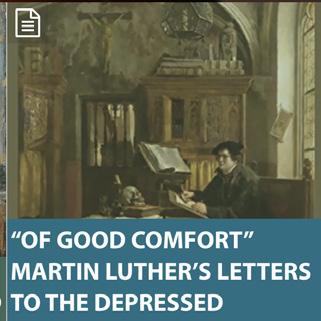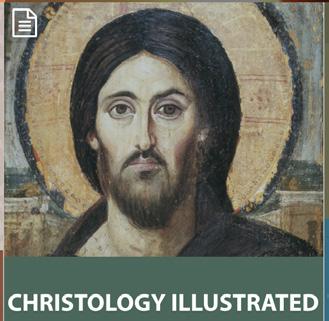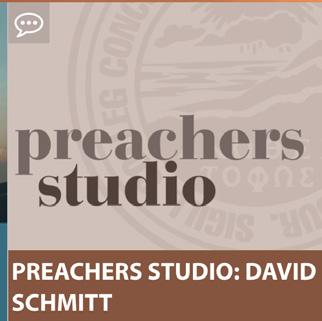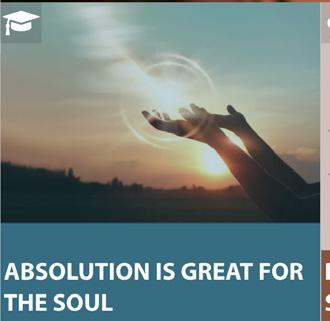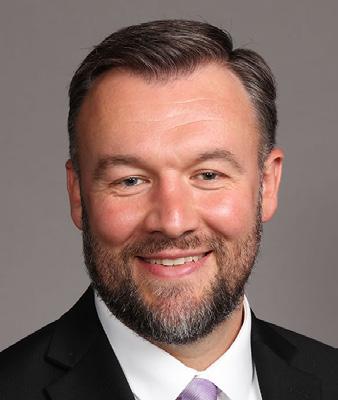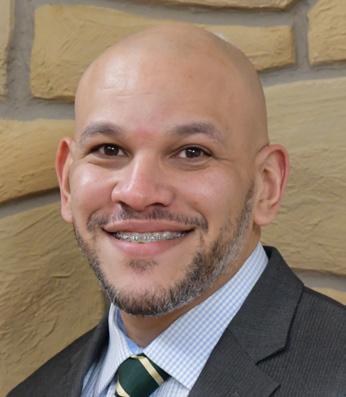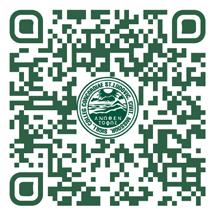Sharing the Gospel. Sharing our Lives.
SHARING: OUR LIVES. THE GOSPEL.
FIELD EDUCATION: OFFERING HANDS-ON MINISTRY EXPERIENCE
BEING A PEOPLE OF HOPE: A PASTOR’S TASK IN FLINT, MICH.


Sharing the Gospel. Sharing our Lives.
SHARING: OUR LIVES. THE GOSPEL.
FIELD EDUCATION: OFFERING HANDS-ON MINISTRY EXPERIENCE
BEING A PEOPLE OF HOPE: A PASTOR’S TASK IN FLINT, MICH.

Students, faculty, staff and guests gather in Wartburg Hall
Sept. 9, 2022, to hear Professor of Historical Theology Dr. Erik Herrmann share some words of wisdom during Prof ’n Stein, a treasured Seminary tradition. Photo: Jill Gray
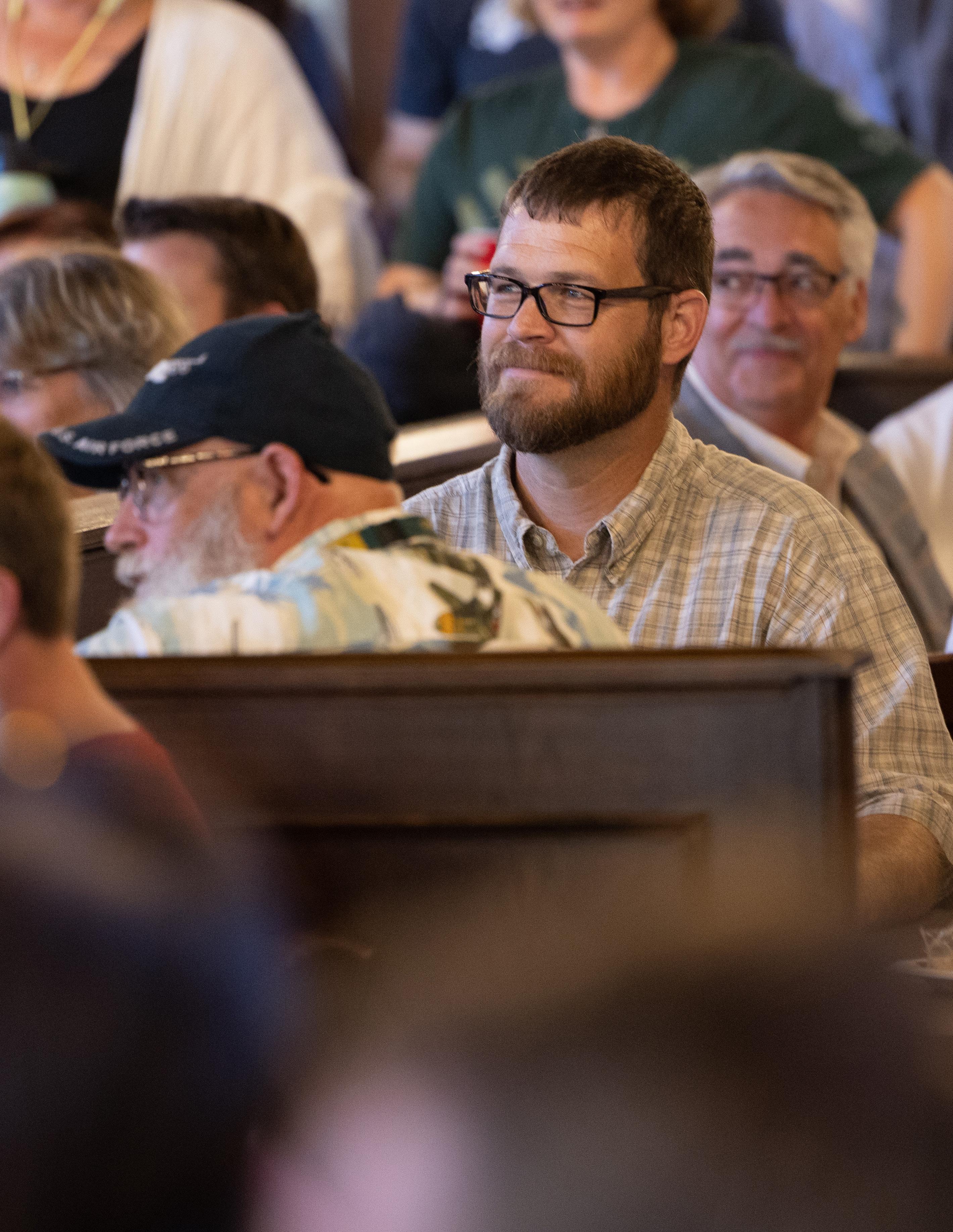
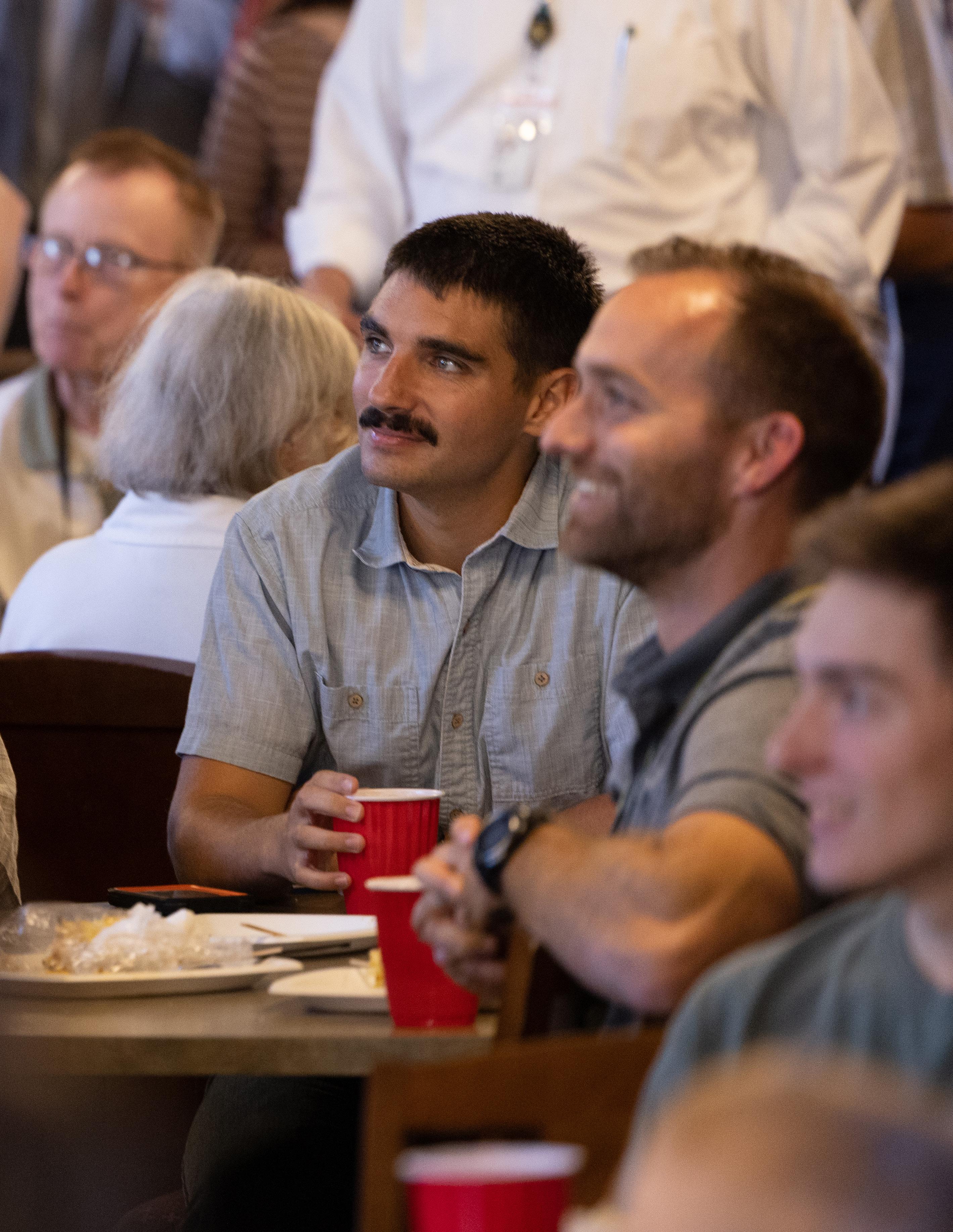
ON
Several students enjoy dinner together. From left, Justin Wood, Ashley Wangerin, Daniel Bueckman, Liz Taylor and Rachel McCloskey (not pictured). Photo: Harold Rau
PRESIDENT
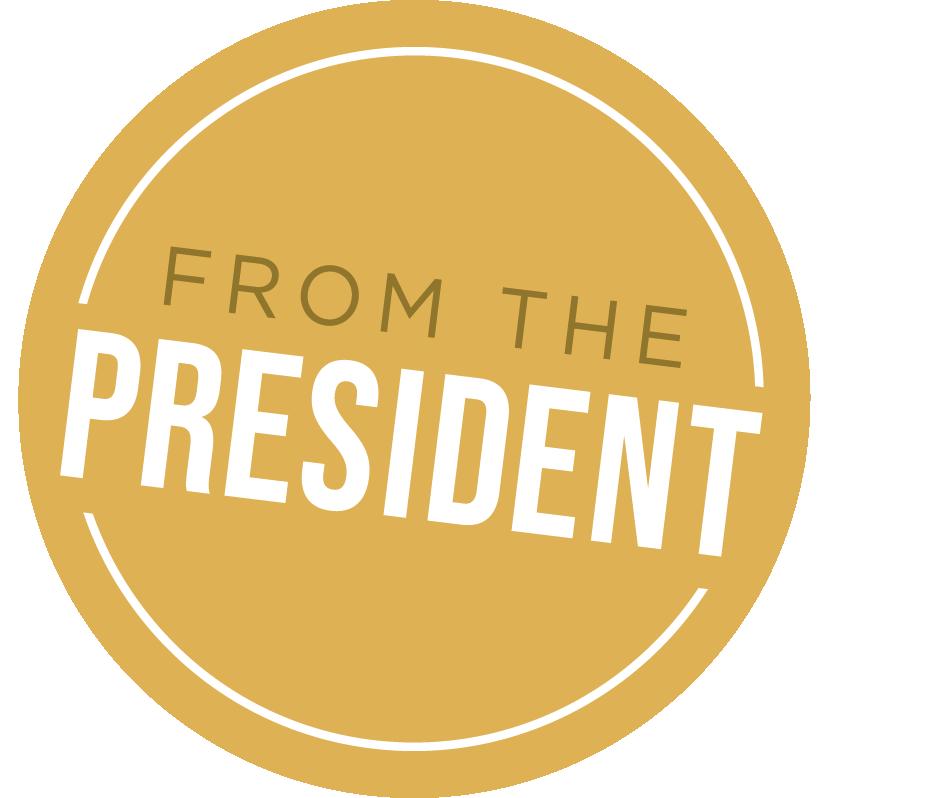
Dr. Thomas J. Egger
PUBLISHER
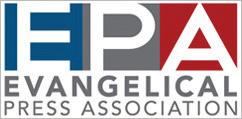

Dale A. Meyer
EXECUTIVE EDITOR
Vicki Biggs
EXECUTIVE EDITOR
Vicki Biggs
MANAGING EDITOR
Melanie Ave
MANAGING EDITOR
In his First Letter to the Thessalonians, the Apostle Paul writes, “So, being affectionately desirous of you, we were ready to share with you not only the gospel of God but also our own selves, because you had become very dear to us” (1 Thess. 2:8 ESV).
Melanie Ave
ART DIRECTOR
Beth Hasek
ART DIRECTOR
DESIGNER
Jayna Rollings
Courtney Koll
DESIGNERS
WRITERS
Michelle Poneleit
Melanie Ave
Jayna Rollings
Deaconess Rebekah Lukas
Sarah Maney
WRITERS
Jacob Moore
Sarah Maney
Dr. Ronald Mudge
Daniel Mattson
Lisa Mills
PHOTOGRAPHERS
Paul’s ministry among the many congregations he founded was no detached, impersonal, justchecking-the-boxes kind of ministry. Paul cared about these people! He spent time with them. He lived among them. He invested his whole life into them while he was with them. He shared not only the Gospel of God but also his own self! This is the kind of laborer for the Lord’s harvest that we are aiming to form here at Concordia Seminary.

With the beginning of each new academic year, the Seminary chooses a theme that will set a tone for our endeavors as students, faculty and staff. The theme for our 2022-23 year — and for this issue of Concordia Seminary magazine — is “Sharing the Gospel—Sharing Our Lives.”
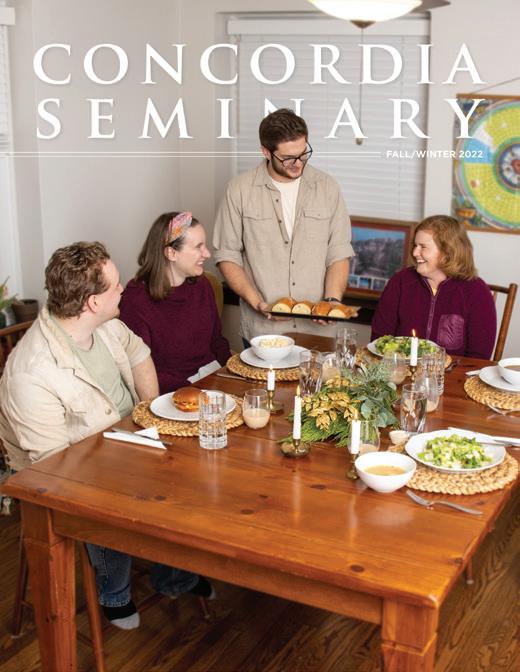
Davin Alberson
Travis Scholl
Jill Gray
Seminary life gives us the opportunity to worship together each morning, to study God’s truth together each day, to encourage one another in the faith frequently and in various ways, to bear witness to Christ’s mercy and salvation in local congregations and in friendships beyond our community. In all this, we “share the Gospel” with one another and with others.
Sid Hastings
PHOTOGRAPHERS
Courtney Koll
Jill Gray
Deaconess Rebekah Lukas
Sid Hastings
Sarah Maney
Courtney Koll
Harold Rau
Sarah Maney
Bridgette Sharp
But our students’ time at the Seminary also prepares them to be pastors, deaconesses and missionaries who are happy to share their lives, to share their very selves. To eat together, celebrate together, play sports together, raise children together, help one another out in a pinch, pray for one another’s needs, invite one another into their homes.

Liz Taylor
Michelle Poneleit
Harold Rau
What a joy it is to see our students sharing the Gospel and sharing their lives, and to know that they soon will be called to congregations and communities where they will continue sharing the Gospel and sharing their lives. Just as our Lord Jesus shared Himself, so completely, with us.
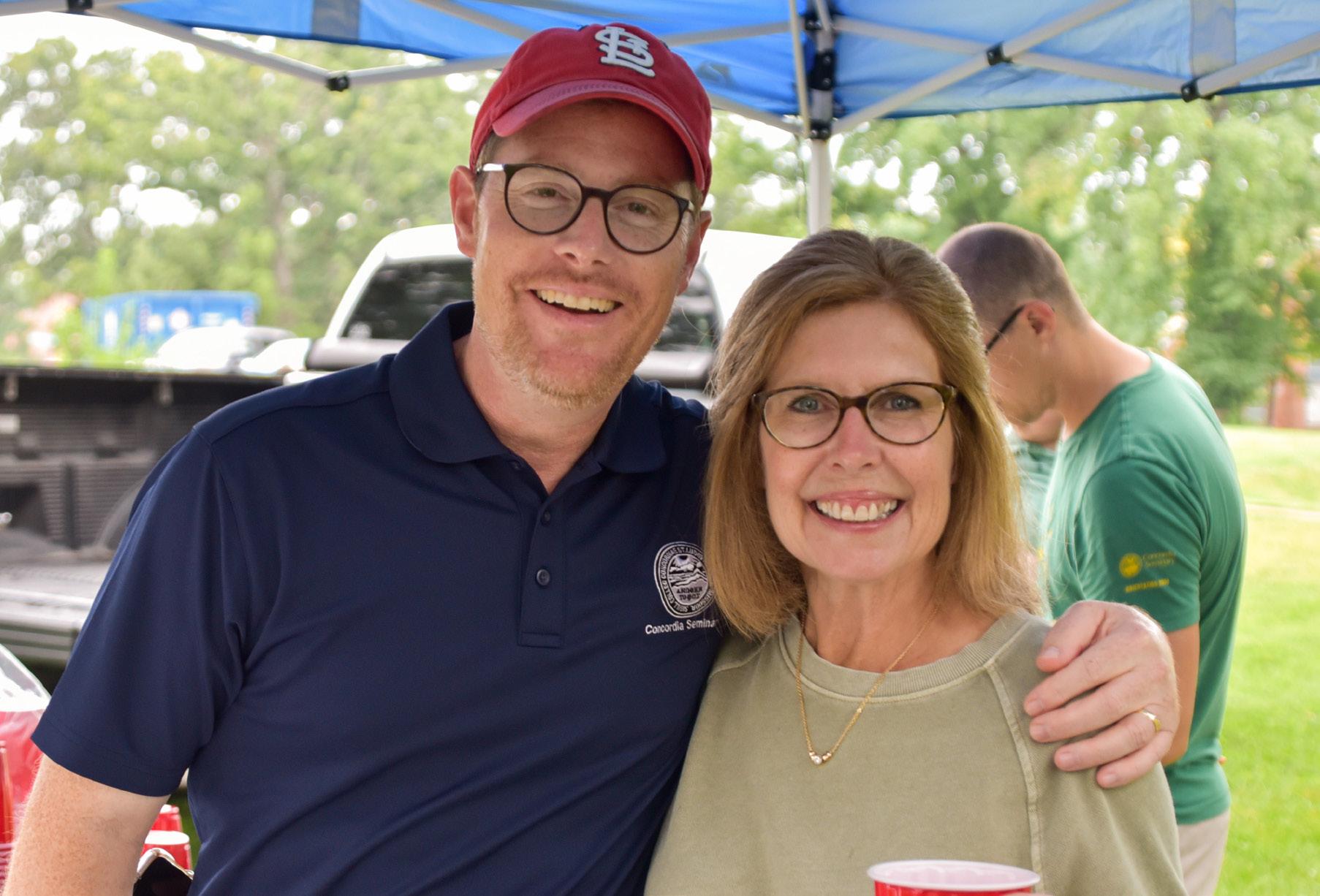
May He who gave His whole self for you, even to death on a cross, give you great joy in knowing this: You are His and He is yours, forever!
Dr. Thomas J. Egger, President

6 Sharing: Our Lives. The Gospel.
10 Field Education: Offering Hands-on Ministry Experience
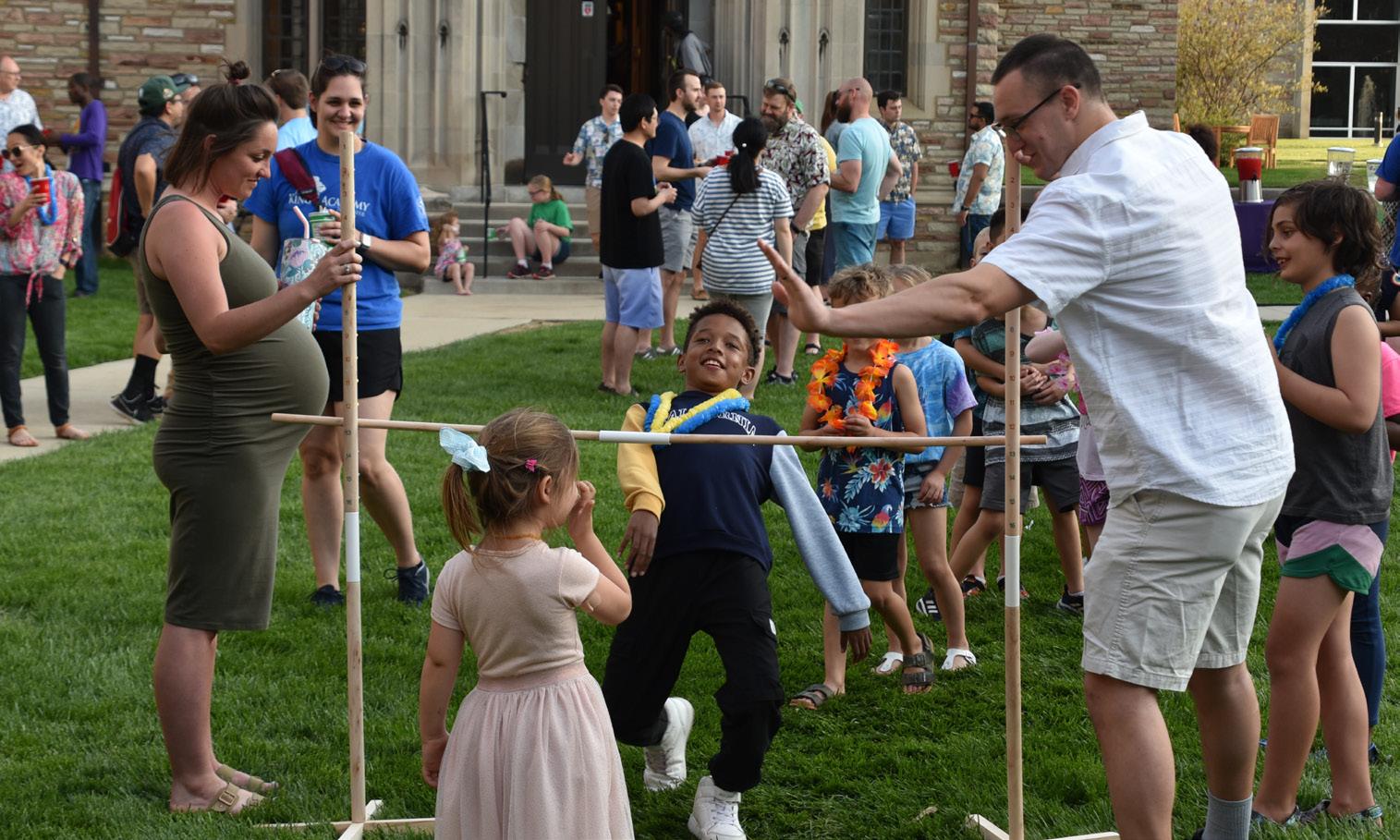
4 From the President
14 Student Spotlight

16 Faculty Focus
18 Alumni and Friends
20 Support Your Sem
22 News Worth Noting
18
Concordia Seminary serves church and world by providing theological education and leadership centered in the Gospel of our Lord Jesus Christ for the formation of pastors, missionaries, deaconesses, scholars and leaders in the name of The Lutheran Church— Missouri Synod.
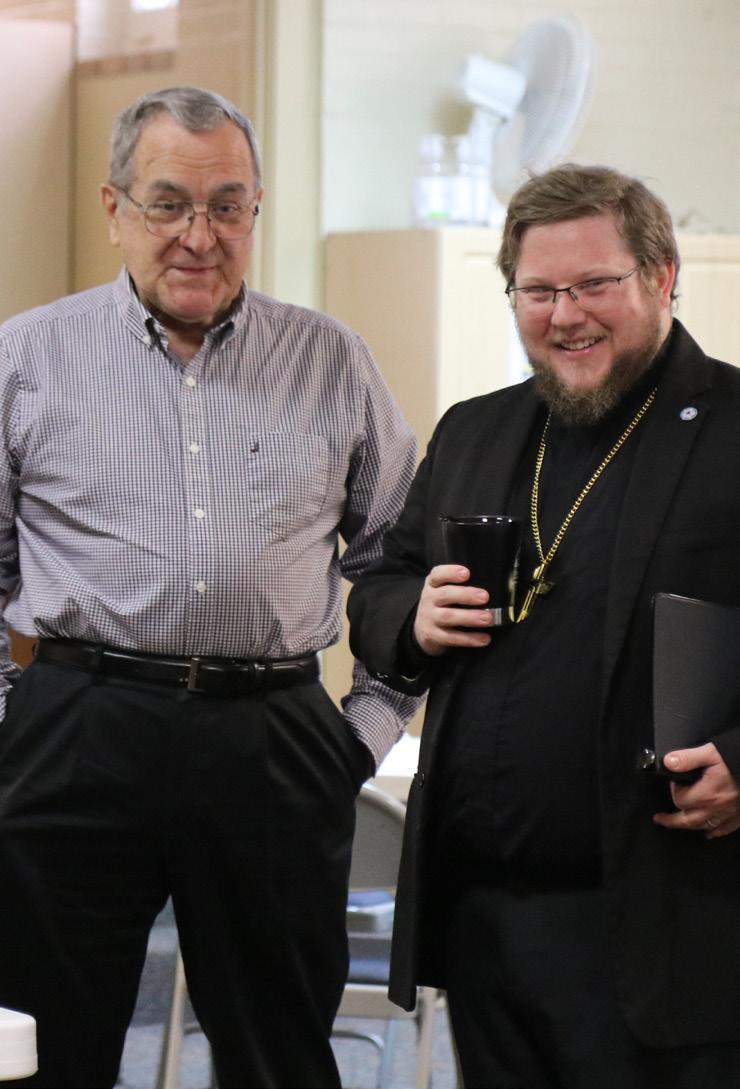
WANT TO JOIN OUR MAILING LIST?
To be added to the mailing list, or to receive the magazine electronically, address correspondence to: Concordia Seminary magazine, Concordia Seminary, 801 Seminary Place, St. Louis, MO 63105; call 800-822-5287; or email magazine@csl.edu. Congregations may request copies in bulk for distribution within their churches.
Copyright © December 2022, Concordia Seminary, 801 Seminary Place, St. Louis, MO 63105. All rights reserved. No part of this publication may be reproduced without the prior written permission of Concordia Seminary.
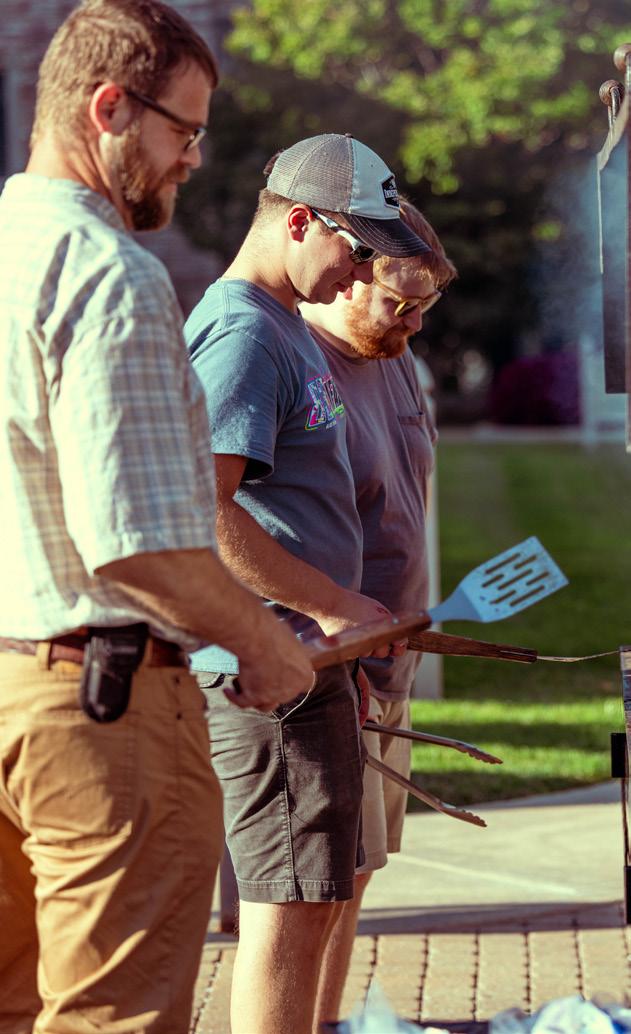

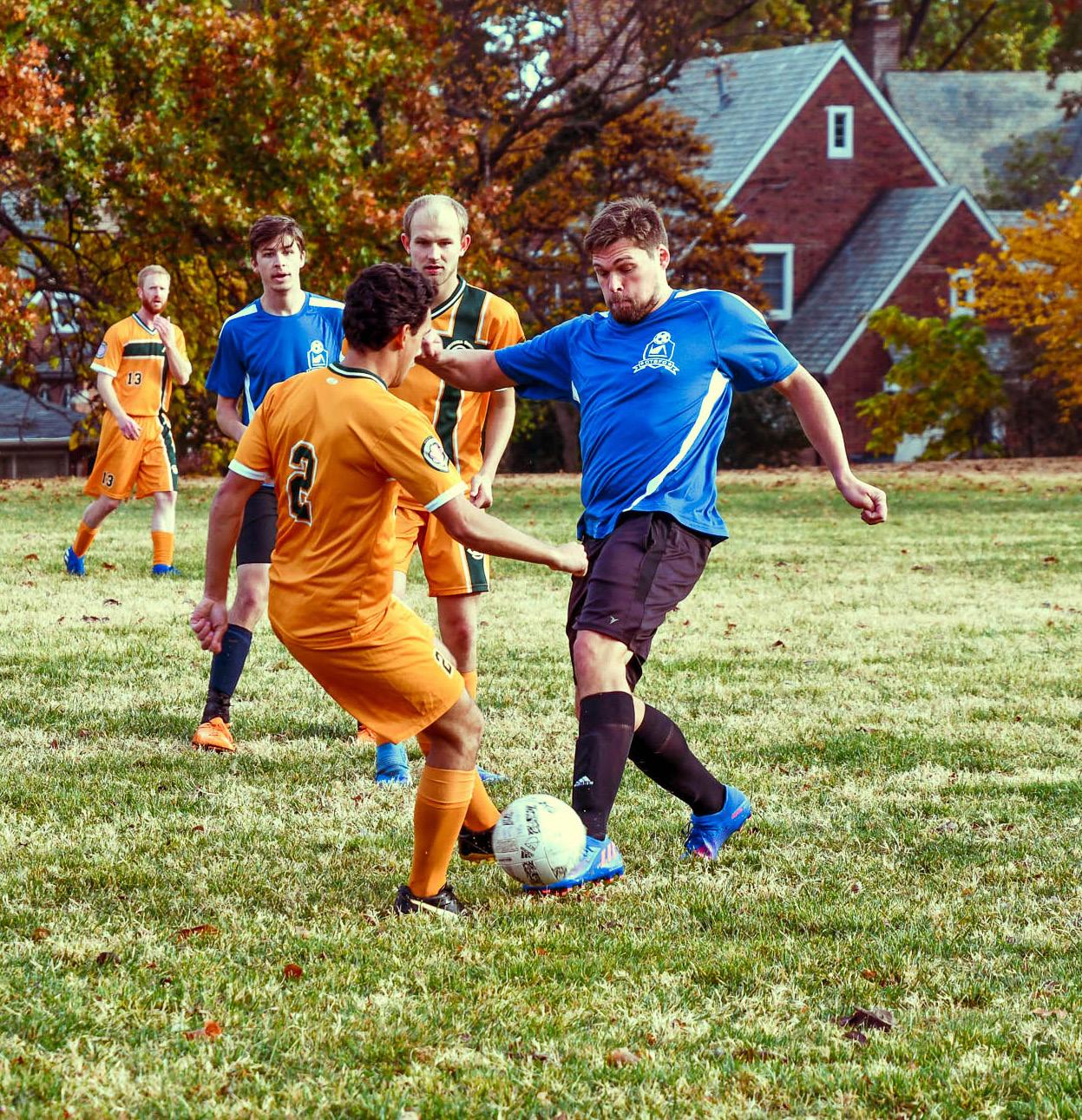

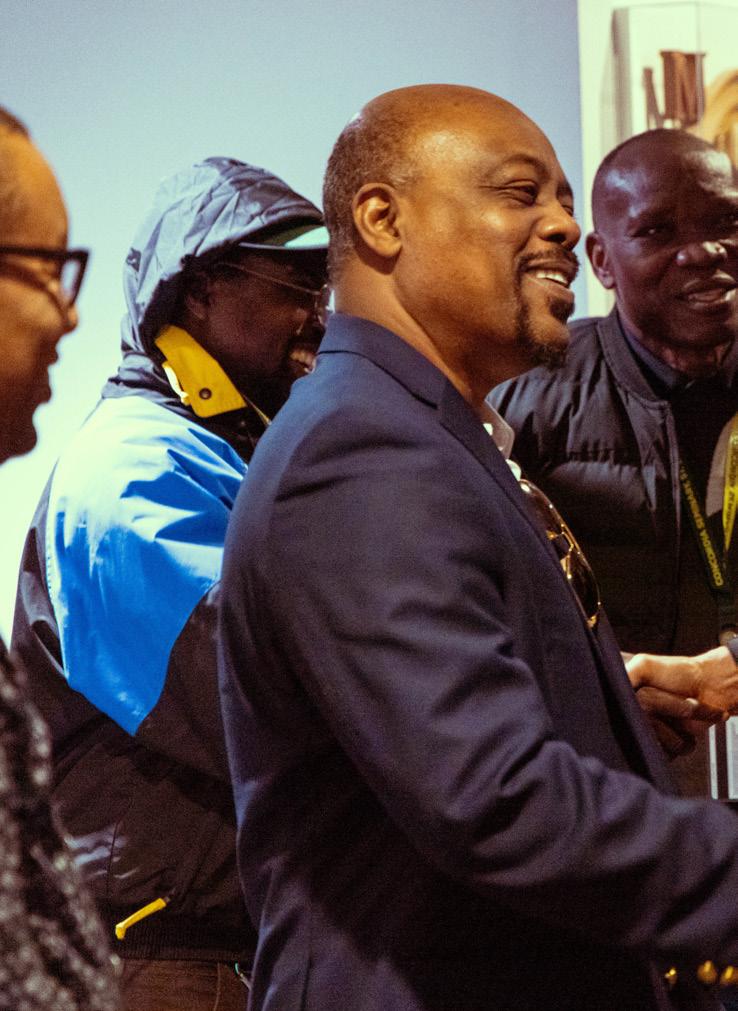

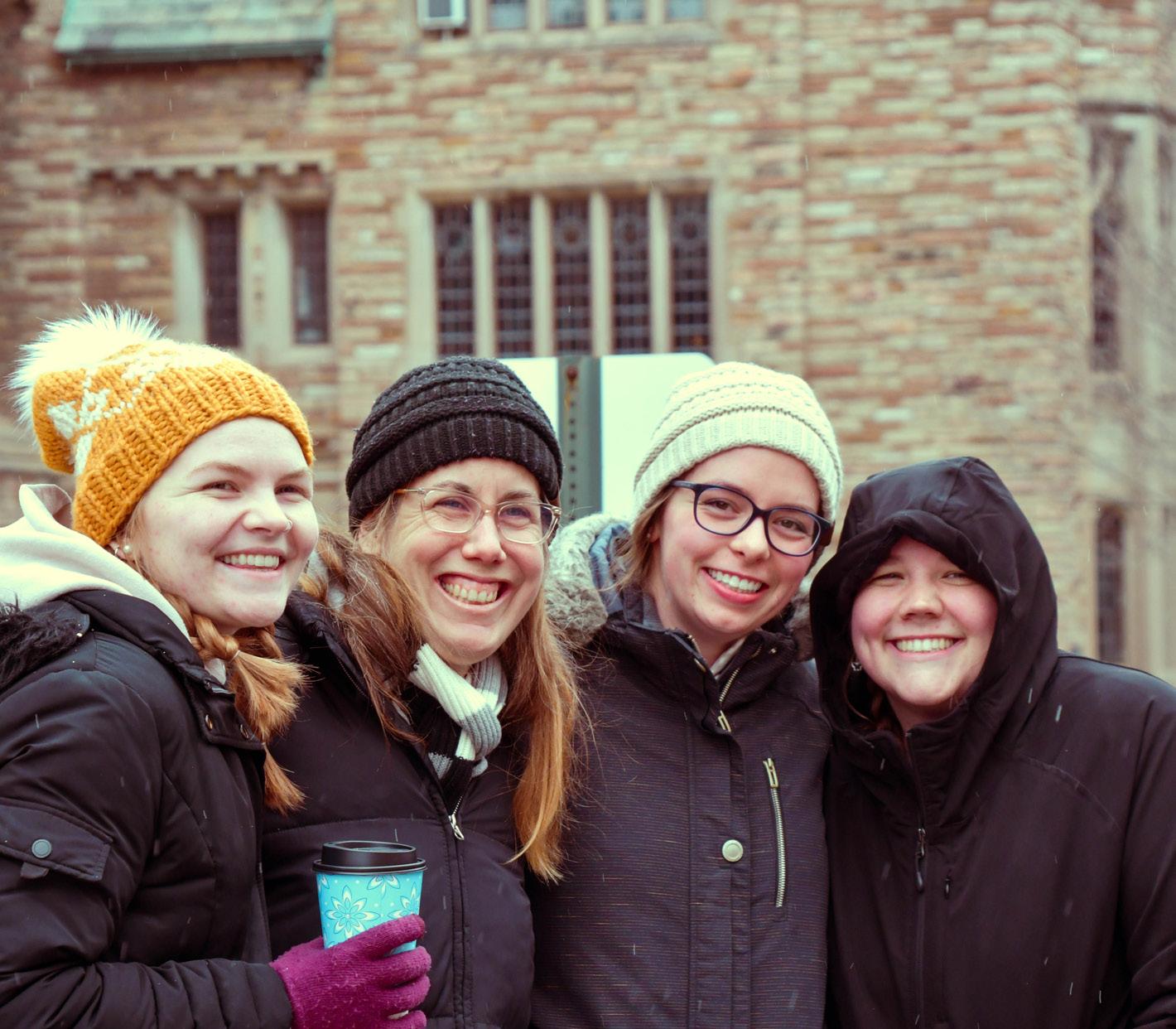
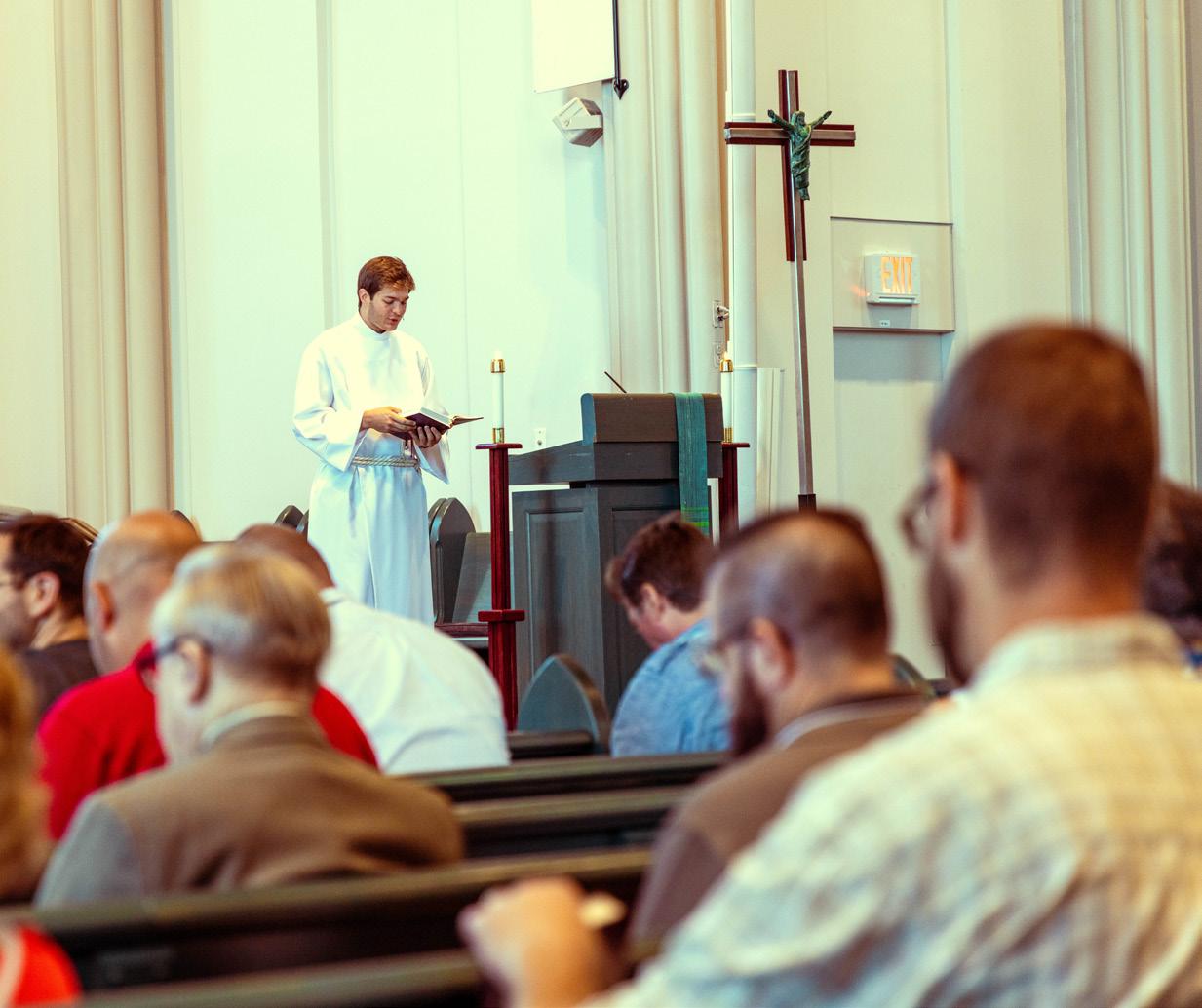









Concordia Seminary, St. Louis’ 2022-23 academic year theme is “Sharing the Gospel—Sharing Our Lives,” based on 1 Thess. 2:8. This theme highlights beautifully the way that the grace of Jesus Christ permeates our life together. Jesus gives us His grace as a gift and makes it possible for us as forgiven sinners to love and to serve one another, sharing our very lives with each other.
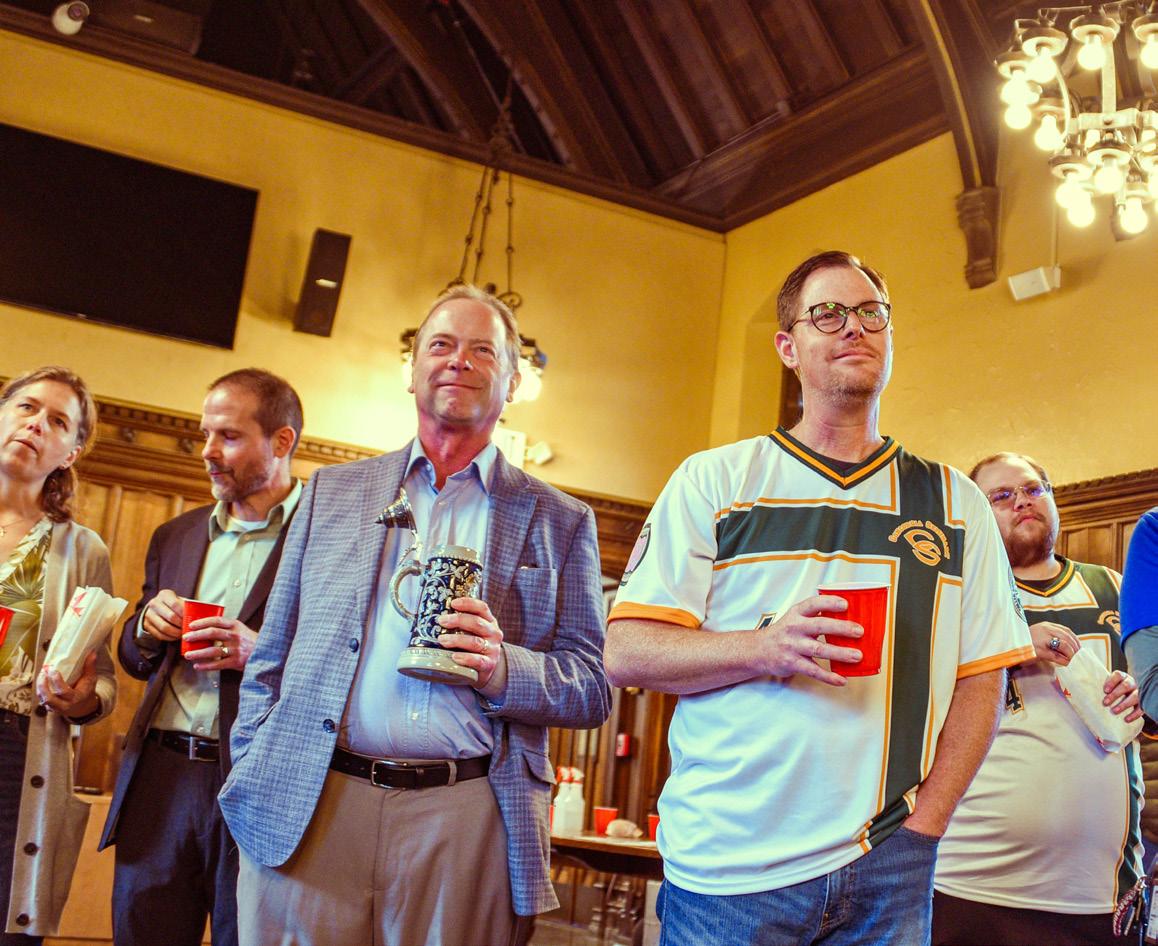
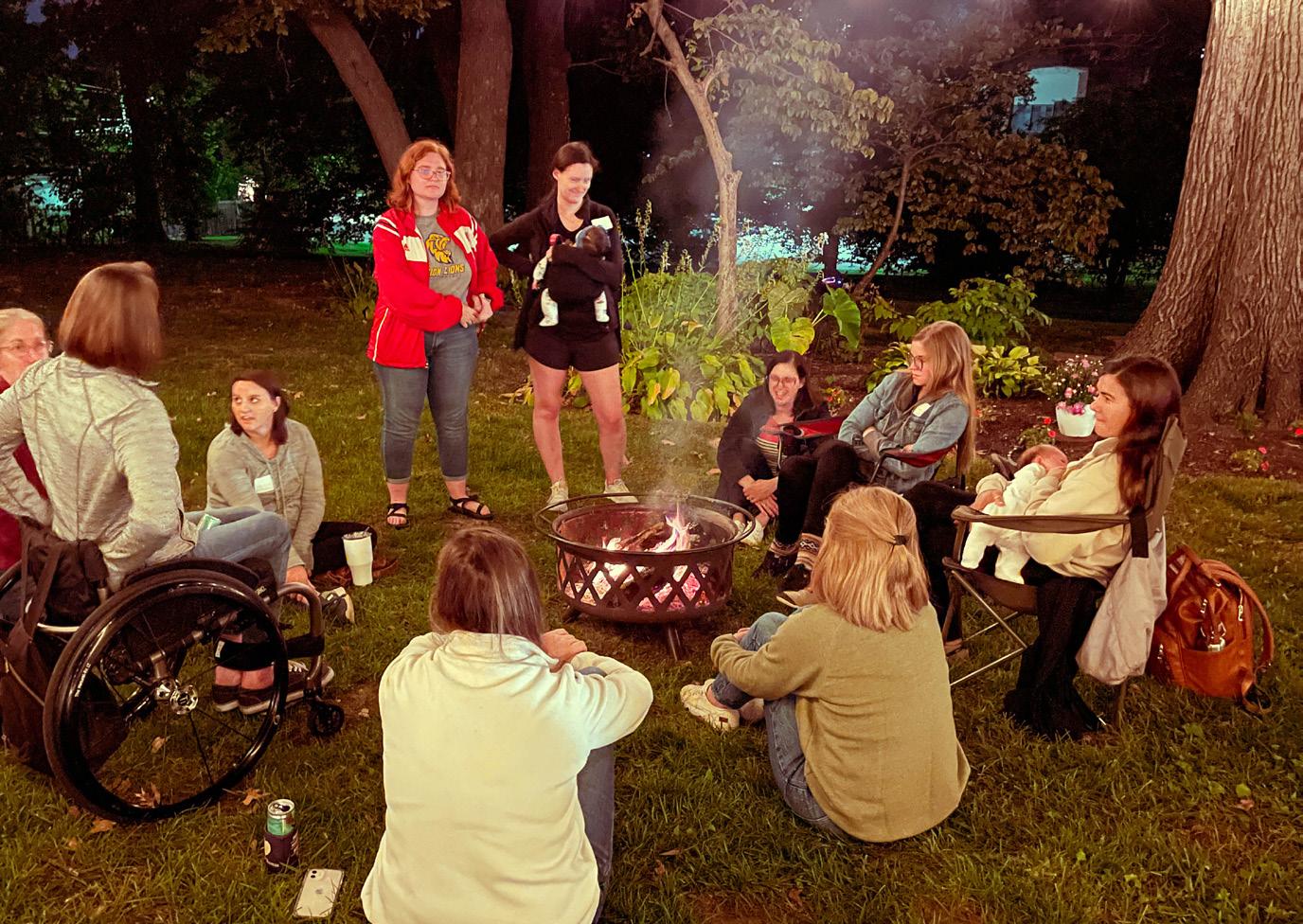
We often find ourselves wanting to share our lives with others and to have others share their lives with us but at the same time, because we are sinful human
beings, we fear that others might mock, criticize or reject us if they knew what we are really like. Some respond to this situation by pretending to be someone else. They engage in a false sharing that leaves them feeling isolated, lonely and exhausted as they try to be someone they are not. Others respond to their loneliness with anger, becoming bitter toward other people and sometimes even lashing out at them.
As Christians, however, Jesus sets us free to share our true selves with others and to receive the grace that
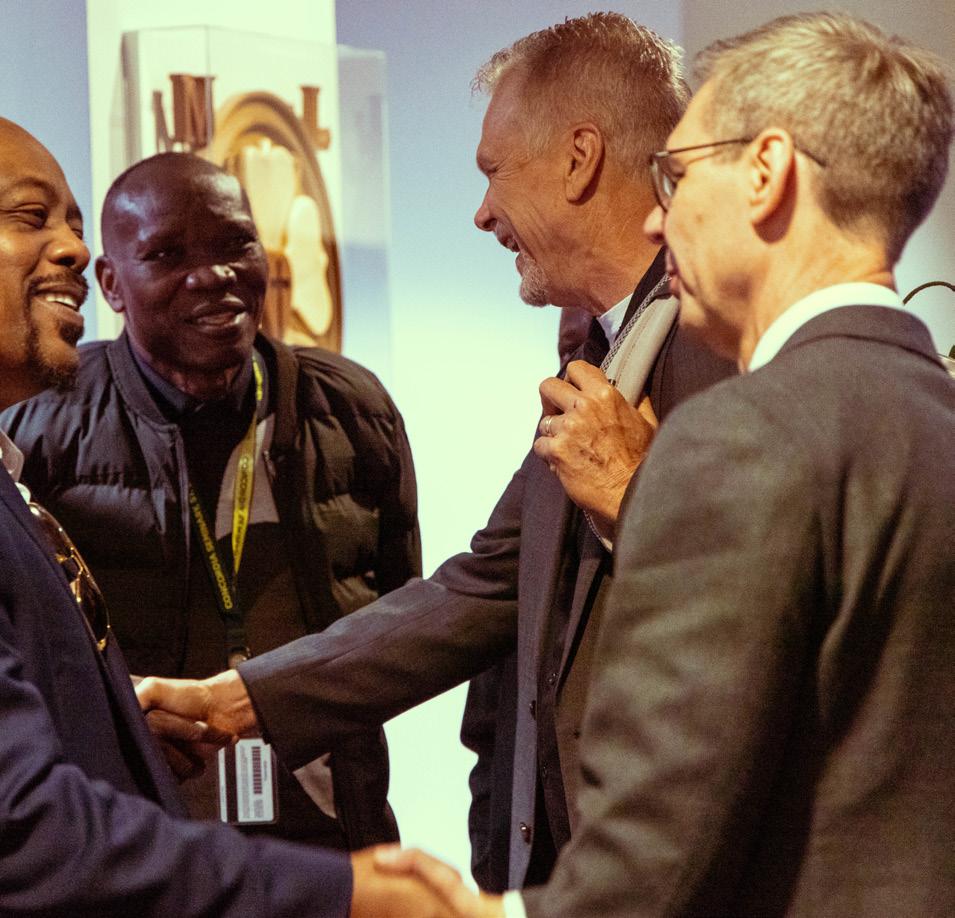

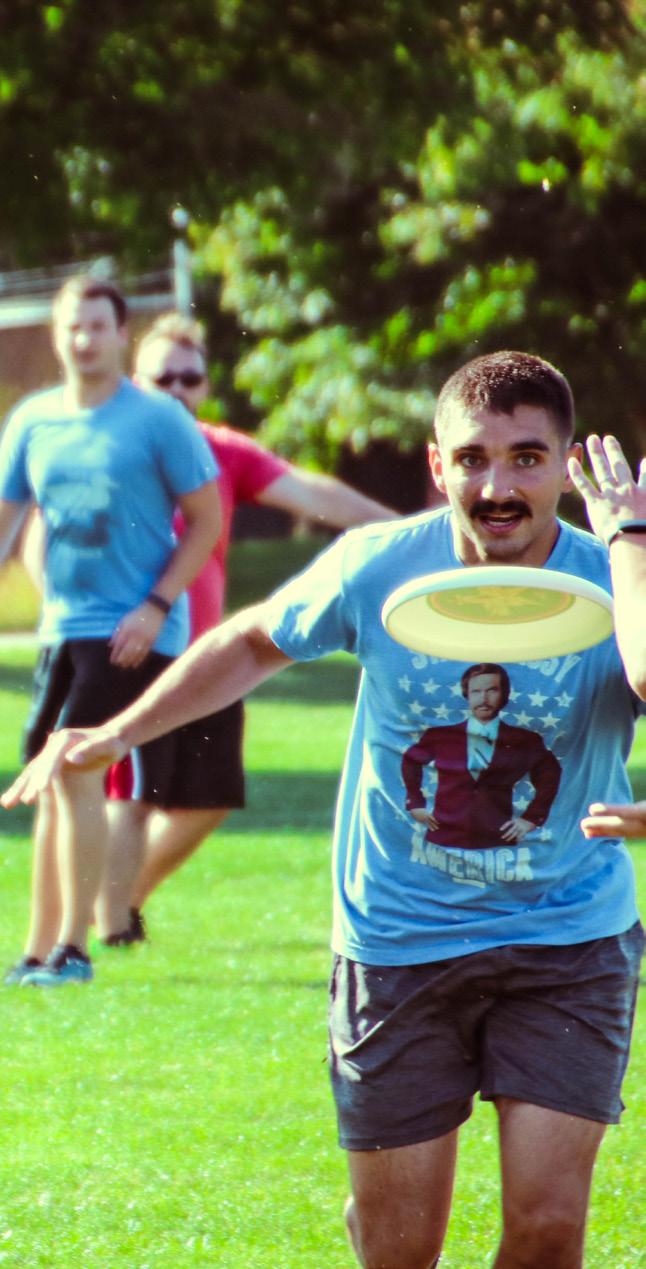
CONTINUED FROM PAGE 7 >

helps us to welcome others into our lives. We confess our sins to Christ, receive His forgiveness and ask the Holy Spirit to transform us so that we love and serve others as Jesus wants us to do. Because of what Jesus has done for us, we share the Gospel as we share our lives. We forgive each other, treasure each other and spur each other on to works of service.
As the chapel is at the center of our physical campus at Concordia Seminary, it is also at the center of our life together. We meet in a chapel that is in the shape of a cross, which reminds us by its very architecture that Jesus paid for our sins on the cross. We walk past the baptismal font as we head into the sanctuary, and we are reminded that we have been baptized into the death and resurrection of Jesus. We meet together and receive the gifts of Jesus Christ together. And the grace of Jesus Christ is with us as we share our lives with each other and as we step out into the wide world.
In our classes, we develop our knowledge, skills and attitudes, and we share the Gospel and our very lives with each other. We help each other to learn, applying the sum of our knowledge and discipline to help all of us to develop good skills and habits. In our formation labs, we share our lives in a more active and deliberate way. Students from different backgrounds and with different personalities talk about pastoral and personal issues, develop strong relationships with each other and pray with and for each other. When we disagree, we talk through our disagreements with honesty, respect and grace.
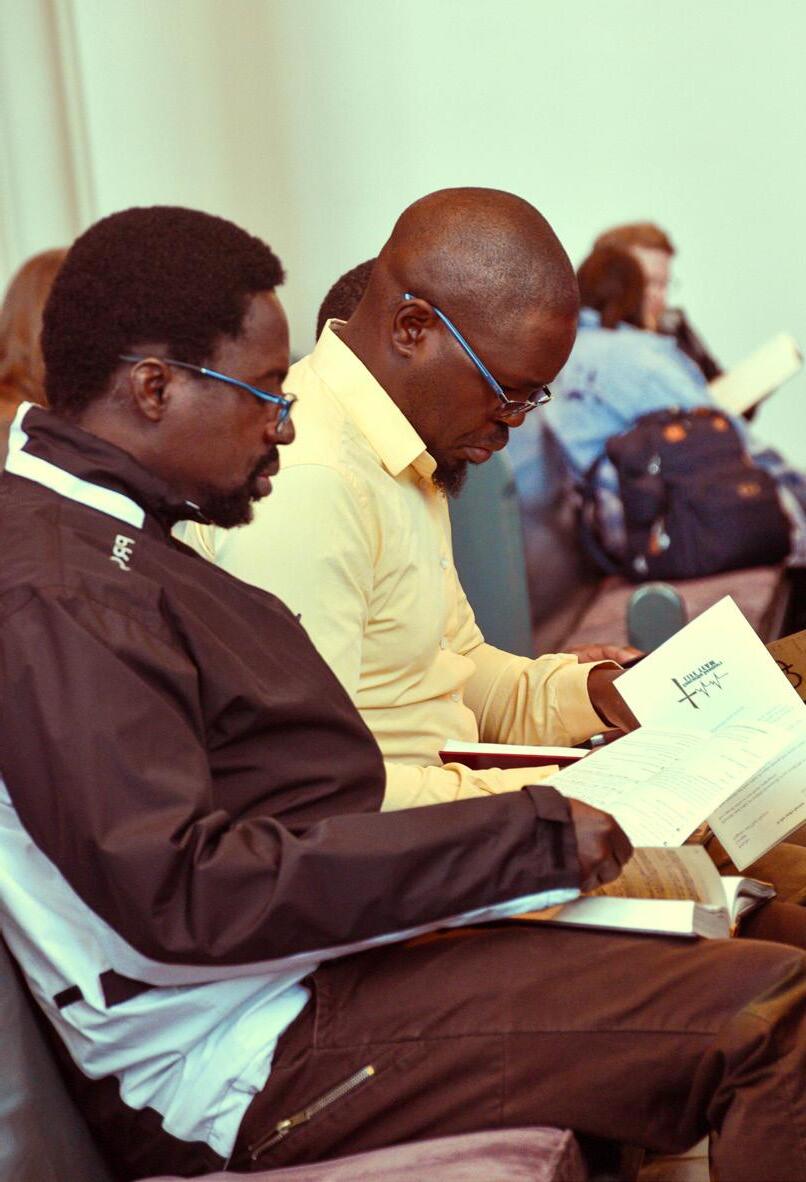
At Concordia Seminary, we work hard, and we play hard — together.
We learn, grow, sweat and laugh through intramural and varsity sports. Our monthly Prof ’n Stein gatherings give us the opportunity to enjoy fellowship, food and drink as a professor holds forth on a topic that is both humorous and edifying. Our Friday night BBQs and our all-campus events like Octoberfest, Jambalaya Fest and Springfest create more opportunities for us to share our lives and to live and speak the Gospel of Jesus Christ to each other. A number of our professors and many of our students live on campus, and those who do not live on campus still spend a lot of time here. Professors host formation-lab groups on their patios and regularly welcome students and other professors into their homes. My family lives on campus, and my wife, Lisa, our children and I all appreciate being able to walk for a few minutes and be with others from the community or to take part in chapel or some other oncampus activity.
As we share the Gospel and ourselves, we live this Christian life together. We celebrate births and birthdays. We give gifts and offer meals during times of need. We rejoice together and mourn together. In times of sadness, we console each other. Our community welcomes newcomers and encourages those who have completed their studies and are heading off to calls or other adventures. The Mudge family moved to campus last summer and experienced firsthand how welcoming the Concordia Seminary community can be and how much it helps with the emotions and disruptions brought about by a family move.
At Concordia Seminary, we know that we are a community within larger communities. Our students and our graduates span the globe. Our Orientation week and summer intensive courses give us special joy because our distance program students get to be together in person with our residential students. We are part of God’s church on earth, and the Lord uses our chapel services to remind us that we are part of the universal church that spans all time.
The Lord sends our students, vicars, interns and graduates out into the world and all over the world. The Concordia Seminary community includes people from many of the nations, tribes, peoples and languages of the world, and we are striving to love, to serve and to speak the Gospel to people of all nations, tribes, peoples and languages. As our students learn and share their lives, the Lord prepares them to serve Him in the world and sends them out to do exactly that. During Orientation week, our students
engage in servant events in and around St. Louis. Field education, modules, vicarages and internships give our students opportunities to share the Gospel and themselves. For example, some of our students help Christian Friends of New Americans welcome immigrants and refugees to St. Louis and speak the Gospel to them. As another example, one of our deaconess interns lives and speaks the love of Christ to people with dementia and Alzheimer’s.
Concordia Seminary graduates serve as pastors, deaconesses and missionaries; as hospital, prison and military chaplains; and in a variety of other ways. Wherever we go, we share the Gospel and we share our lives. We form and join communities that are permeated by the grace of Jesus Christ. When we do this, we are doing what we were taught to do and living the way we lived at Concordia Seminary. The Lord uses these communities to welcome everyone and to bring the Gospel of Jesus Christ to all who will listen. Our graduates also meet people who are lost, broken and bitter and point them to Jesus Christ. Our graduates listen, care, help and love. They describe the gifts that Jesus has given to them and urge others to receive the forgiveness and grace of Jesus. They urge others to receive the Gospel, to share the Gospel and to share their lives.
As graduates of Concordia Seminary serve throughout the world and join various congregations and communities, they never entirely separate themselves from the community of Concordia Seminary. Our community is patient and tough. We do the work necessary to keep sharing our lives even when we are far apart physically. We rejoice when the Lord puts us in the same area as someone we already know. We track each other down at conferences or when we are passing through town. We look forward to events like the LCMS Youth Gathering and LCMS district and national conventions in part because these sorts of events give us the opportunity to reconnect with loved ones and to catch up. And we look forward to eternity when we, in our resurrected bodies, will see Jesus face-to-face and experience all the joy and surprises that He has in store for us. Eternity with Christ will certainly be full of surprises, but it will certainly include sharing the Gospel and sharing our lives.
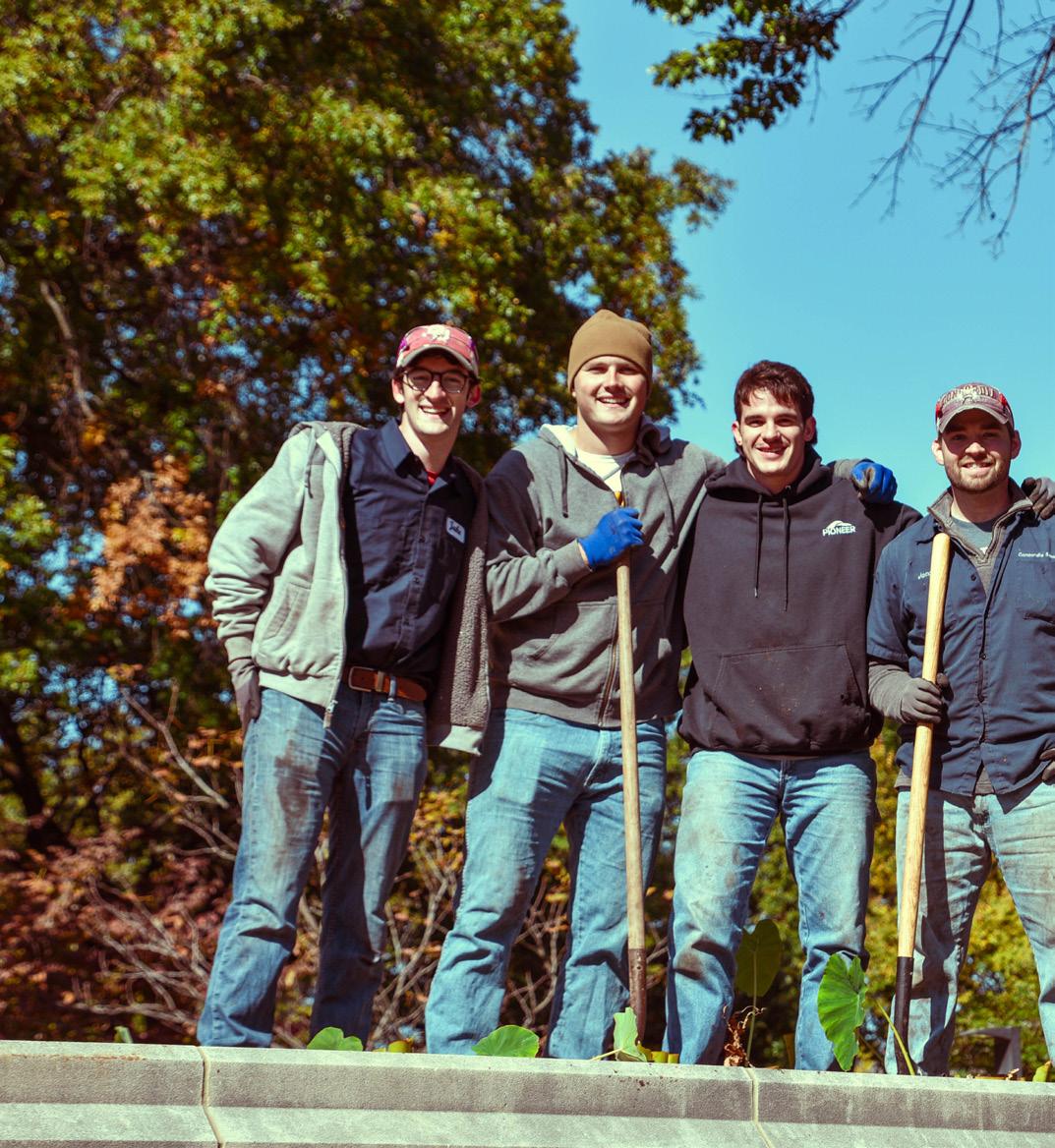

Dr. Ronald Mudge is provost and professor of Exegetical Theology at Concordia Seminary, St. Louis.




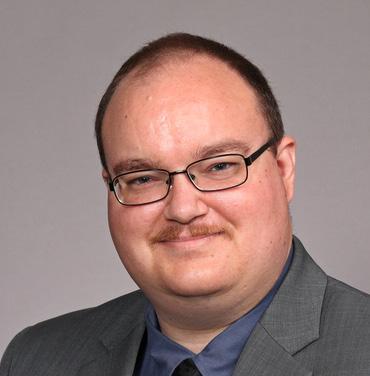
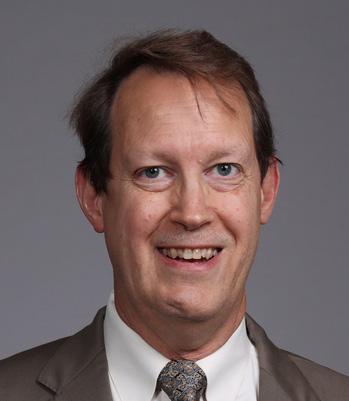 BY JACOB MOORE
BY JACOB MOORE
Concordia Seminary is located in the city of Clayton, which sits in the heart of St. Louis County, Mo. From campus, students can travel in any direction and get a unique cultural experience — be it urban, suburban, rural, big city or small town.
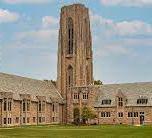
Just west of campus is a suburban conglomerate of towns such as Ladue, Kirkwood and Des Peres. Heading east leads directly to downtown St. Louis and the historical districts of the Central West End and Soulard. To the

north, many of the area’s historical urban neighborhoods can be found. Just a little further past the Mississippi River is the rural area of southern Illinois with the towns of Hamel, Red Bud and Worden.
Because of its unique location in the St. Louis metropolitan area, Concordia Seminary is able to take advantage of its widely varied communities through the Resident Field Education (RFE) Program. Through this program, residential ministerial formation students are sent out to receive hands-on ministry training and
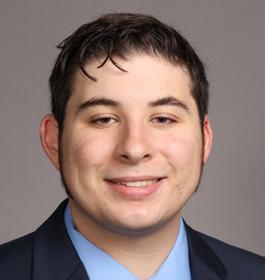
experience. The program deploys Master of Divinity (M.Div.), Residential Alternate Route (RAR) and Deaconess Studies students across the St. Louis area to serve in LCMS congregations, ministries and nonprofit organizations.

There are 84 congregations in the greater bi-state area from four LCMS districts: the Missouri District, the Southern Illinois District, the English District and the SELC District. “I am extremely thankful to all these congregations and pastors who welcome and embrace the students of Concordia Seminary,” said RFE Director Rev. Bill Wilson. “They provide our students with a place where they can grow and be exposed to what life in the church is all about.”
The program gets students out into the community. “Seminarians spend a lot of time reading, researching
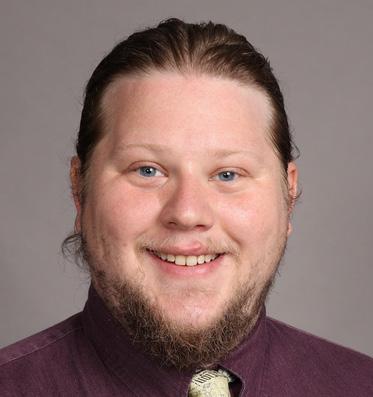
and contemplating theological topics and issues,” he said. “The classroom is the part of their Seminary education where students are challenged on an intellectual level about the Scriptures and Lutheran doctrine. Our field education program takes what the students are learning in the classroom and gives them a chance to use it hands-on in congregations where they are assigned.” The program focuses on three main objectives: helping students grow in their knowledge, skills and attitudes.”
The development of pastoral and diaconal skills is another important part of the RFE Program. M.Div. and RAR students are expected to develop their skills in preaching, teaching and pastoral care, and deaconess students in their witnessing, teaching and diaconal care. Through their field work experiences, students have the opportunity to
CONTINUED ON PAGE 12 >

“The RFE Program is a vital part of the formation of our future pastors and deaconesses.”
-REV. BILL WILSON
CONTINUED FROM PAGE 11 >
understand the dynamics of Word and Sacrament ministry in the context of worship, and to serve those who are homebound or in need of counseling or encouragement.
“It’s so wonderful to see how students grow as individuals from their field work experiences,” said Emi Cella, RFE administrative assistant. “The RFE Program helps students recognize their weaknesses so that they may grow and learn from them and, at the same time, embrace their strengths without being arrogant or prideful.”
Fourth-year seminarian Jonathan Lackey’s RFE assignment is at Village Lutheran Church in Ladue. “RFE at Village has been an absolutely amazing experience,” Lackey said. “Experiencing liturgical worship at such a close-knit congregation has been a blessing, one that I am thankful to God for every day. The teaching and service opportunities there are plentiful. Right now, I am blessed to lead the high schoolers in a study of the Epistles of St. John, and it’s the highlight of my week!”
The RFE Program not only assigns students to local congregations but also exposes them to cross-

cultural and institutional ministry. These specific learning modules help students see the importance of engaging with their wider community and learn how they can better serve the community. Cross-cultural and institutional field education is designed for firstyear students and is divided between the fall and spring semesters.
The cross-cultural and institutional experiences exemplify the Seminary’s 2022-23 academic theme well: “Sharing the Gospel— Sharing Our Lives.” Students engage in ministry with and among people of different cultures as the church being a people of all nations comes into focus. At a professional level, students participating in crosscultural field education identify specific cultural patterns and structures that are part of their assignments and better understand how they can shape and influence ministry. But on a personal level, students are encouraged to establish relationships with people of other races and ethnicities and with those who may speak other languages. “Learning how to react in new situations with confidence and Christian integrity is important for our students to learn before they leave the Seminary and enter full-time vocational ministry,” Wilson said.
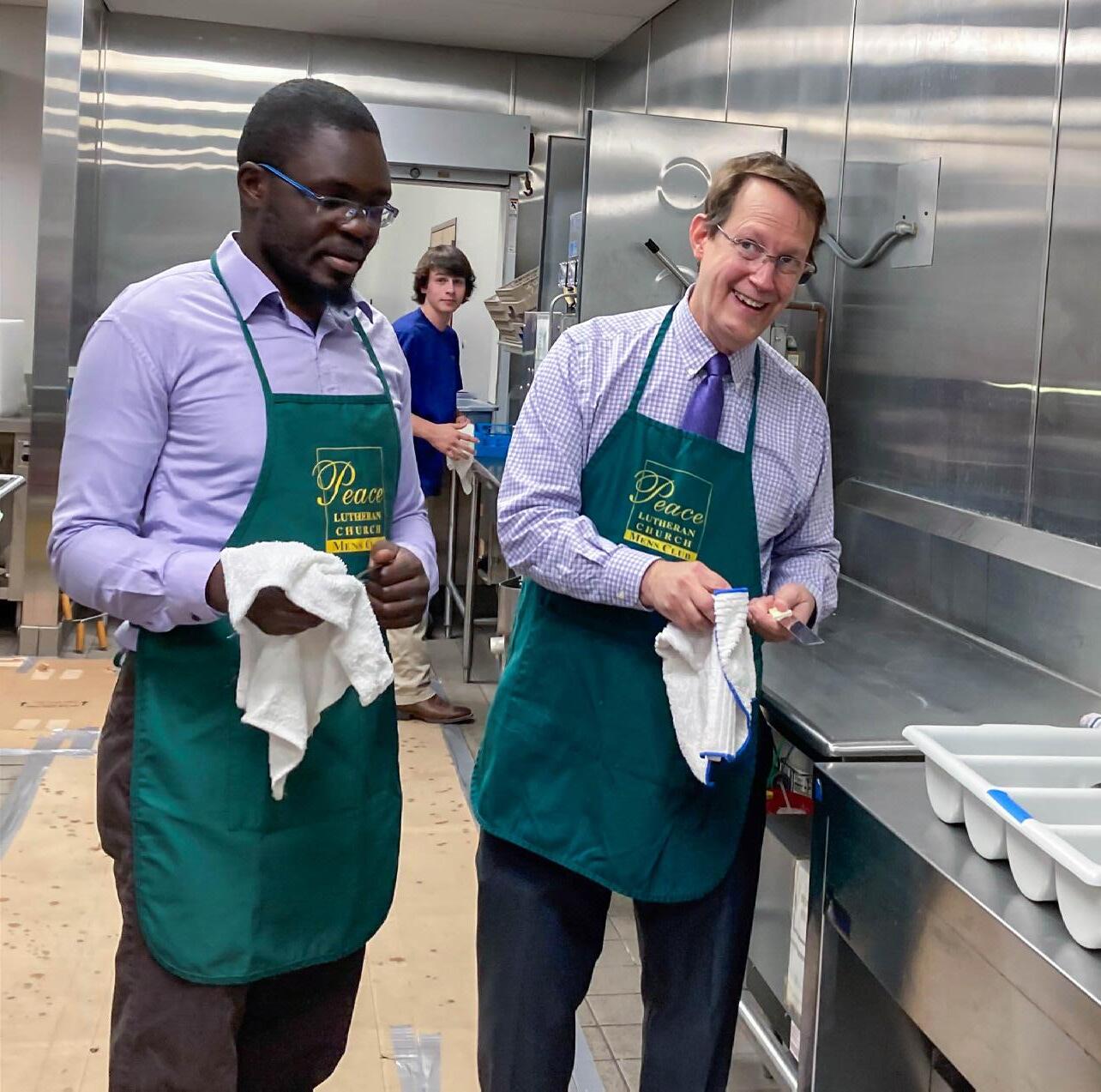
“[RFE congregations] provide our students with a place where they can grow and be exposed to what life in the church is all about.”Master of Arts student David Osachi and Residential Alternate Route student David Evans serve at a sausage dinner at Peace Lutheran Church in St. Louis.
-REV. BILL WILSON
Some experiences offered to students within the cross-cultural module include a weekly sign language class and assignments with Christian Friends of New Americans, where students assist people who are new to this country with after-school tutoring, fellowship groups and Bible study classes.
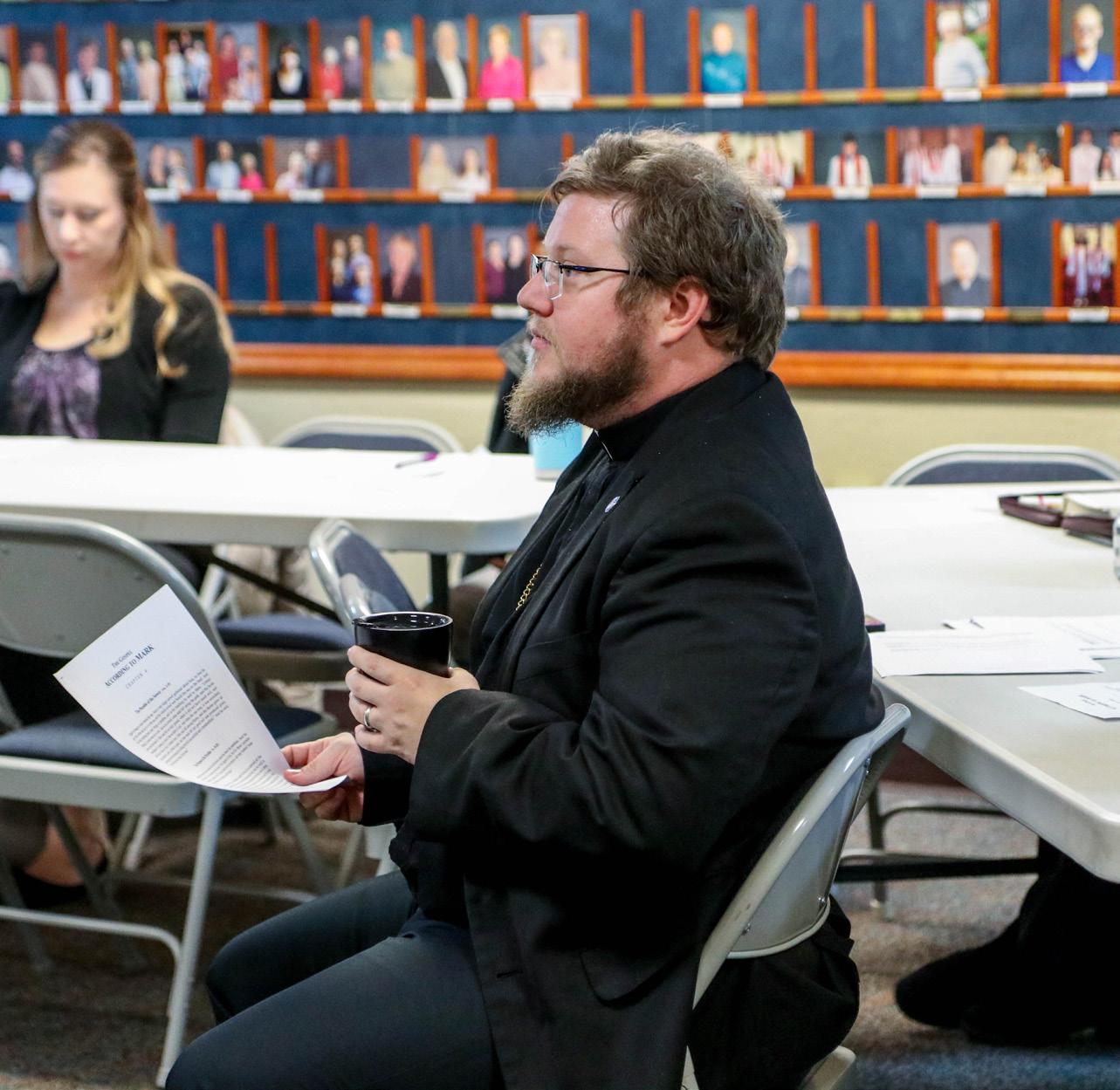
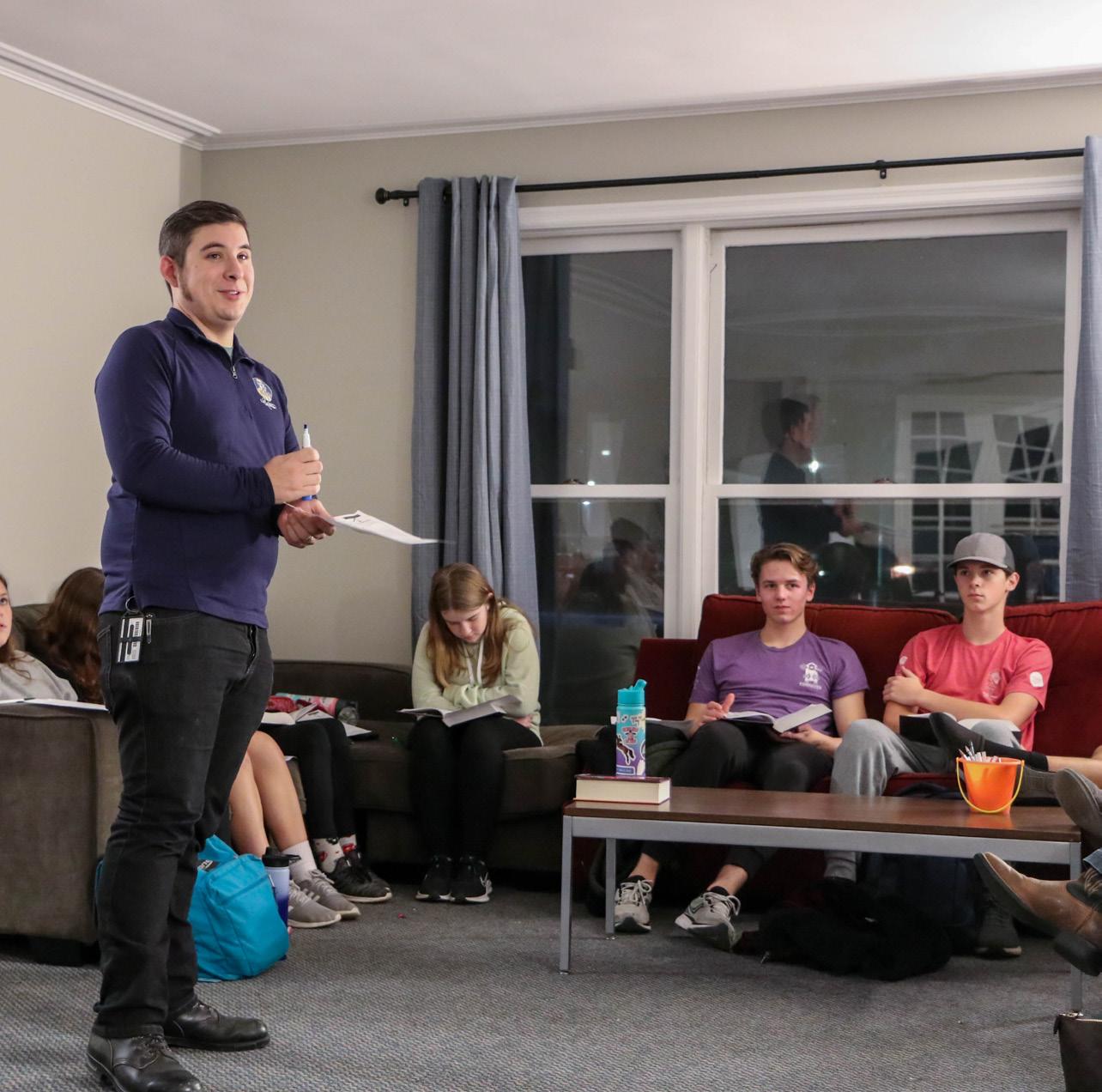
In addition to cross-cultural field education work, students also participate in institutional settings such as in nursing homes, assisted living homes, retirement homes, hospitals, hospice care, prisons and jails. Students, with supervision, work with patients, clients, inmates and residents in real-life situations. Students are challenged to engage with others at their relational, intellectual and spiritual levels. Some places where students serve include Lindenwood Area Senior Ministries, Southwestern Illinois Correctional Center and St. Mary’s Hospital.
Second-year M.Div. student Davin Alberson serves at the Young in Spirit Adult Day Center located near Forest Park, which is just minutes from the Seminary. Young in Spirit provides meals and rehabilitation for adults who have genetic disorders such as Down Syndrome.
“By working with people at Young in Spirit I am learning how important it is to meet people where they are in life. I believe the love and care that I bring to this work will help me as a pastor,” he said.
“One of the best things about it is seeing the joy and excitement from the young adults when I am teaching and ministering to them.”
New to the field education program this year is the ability students have to create their own modules. If students are interested in a specific area like chaplaincy, technology or music, they can work hand-in-hand with the RFE office to create a module tailored for them. Through this tailored approach students can discover what they are passionate about and combine it with ministry.
In the Gospel of Matthew, Jesus told His followers to go and make disciples of all nations by baptizing them and teaching them everything He commanded. “One of the goals of our ministerial formation process is for our students to put what they have learned in the classroom into action not only in their churches but in the broader community,” Wilson said. “Students may have the head knowledge, but the field education program enables them to put this knowledge into practice for the benefit of them and those they serve. This is why the RFE Program is a vital part of the formation of our future pastors and deaconesses. It pushes our students out into the communities of the world that desperately need to hear the Gospel of Jesus Christ.”
What does a law enforcement officer have in common with a parish pastor? More than you might think. Retired sheriff’s captain and current Concordia Seminary student Matthew Martin recently sat down with Concordia Seminary magazine and shared how God prepared him for ministry by first giving him a career of more than 30 years in law enforcement.

Martin’s journey began after he graduated from Wayne State College in Wayne, Neb., with a Bachelor of Science in criminal justice in 1989 and started his first job as a patrol officer for the Norfolk, Neb., police department. He married Tami in 1995 and they had two children, Jessica and Jacob. After five years in Norfolk, the Douglas County Sheriff’s Office in Omaha, Neb., hired him, and over the next 27 years, Martin moved from patrol officer to sergeant, to lieutenant, to captain and everything in between.
“I did court security, patrol, was a field training officer and did training for our agency and others, including the state academy. I did criminal investigations, which involved



































everything from portraying a 14-year-old girl on the internet to investigating homicides,” Martin said. “I worked internal affairs for 10 years, testifying in state and federal court, and spent a year and a half in the administrative services bureau.”
In 2014, Martin earned a Master of Arts in public administration from Bellevue University in Bellevue, Neb.
“I started training at the FBI National Academy at Quantico in 2017, but had a medical emergency on the track and had to go home two days in after receiving two heart stints. But I returned the next year, completing the 10-week, 17-credit course through the University of Virginia. I passed,” he recounted with a smile.




















































































































































































































































































































































After serving the county sheriff’s office as captain for about two years, Martin retired in May 2021. And how did he kick off his retirement? He and Tami packed, sold their house and moved to St. Louis in time for Martin to begin summer Greek at the Seminary in June. He started the Residential Alternate Route (RAR) Program that fall.

“I don’t know how much time God has left for me on this earth, but I know with the time I have left, I want to tell people what Jesus has done for them.”
-MATTHEW MARTIN
“Basically, I moved from law to Law and Gospel,” Martin said smiling. “I have some different life experiences than other people, having been shot at or having a knife pulled on me. I’ve had to deliver death notifications and talk with victims of crime. I’ve worked with people experiencing pain and suffering and shared their pain. I feel those are skills that are translatable to this field, this calling of being a pastor.”
While in law enforcement, Martin could not share his faith unless he was directly asked about it. At times, though, he was given opportunities to share his hope in Jesus Christ and the Resurrection, but he still had to walk the line between church and state. “As a pastor, I won’t need permission or have to worry about getting fired for sharing my faith as I might have as a law enforcement officer,” he said.
Working with people experiencing pain and suffering is not the only cross-over skill from law enforcement to pastoral ministry that Martin discovered through his Seminary studies.
“In dealing with officers for more than 30 years, we conducted written exams, interviews, background investigations, polygraphs, psychological exams and physical exams, all before we hired anyone to make sure we were hiring the best people,” Martin said. “Yet, some still failed. They’re human. So we provided tools to get them through.”
Martin recounted a mentor program he was involved with while he worked with the sheriff’s office.
“When done properly, it allowed new employees to team up with older mentors, giving them a way to ask questions they might not have felt comfortable bringing to their supervisor or chain of command,” he said. “It allowed us to ensure the younger guys were getting good counsel, training and support.”






































Now, having been at the Seminary for almost two years, Martin sees the value of that experience and brings it to bear with his classmates. “A lot of the students here are young enough to be my children,” he said. “I’m able to help these younger seminarians, mentor them, guide them as needed, to reassure them they are on the right path even if they feel like they’re failing.”
Yet, Martin acknowledged, he also has a lot to learn. “Like anyone else, I’m broken,” he said. “A lot of times, broken people need another broken person to point them to Christ, to show them the One who can fix us. Here at the Seminary, our professors are first-class. I’m not just learning new things every day. I’m learning new things every hour.
The things of the faith, I’m able to see them and understand them in ways I never have before.”





















Now that Martin is becoming a pastor, he is able to join his previous career and experiences with his new Seminary experiences and education and point broken people to Jesus. “While we didn’t have Confession and Absolution in law enforcement, I was still able to show those guys that we’re all broken, and here’s the path you need to follow to continue in the force,” he said. “Now, I’ll get to help people know the One who is perfect through my specific role in the pastoral office, showing them and walking with them along the path they need to follow to continue in life.”
With only a few months left of his Seminary studies in St. Louis, Martin soon will leave for his vicarage assignment, which, after a year, may be converted into his first pastoral call.





























































































































“I don’t know how much time God has left for me on this earth, but I know with the time I have left, I want to tell people what Jesus has done for them,” Martin said. “I want to share the Good News of Christ’s death and resurrection for us, to help strengthen people’s faith and help them to know their Lord and Savior, Jesus.”
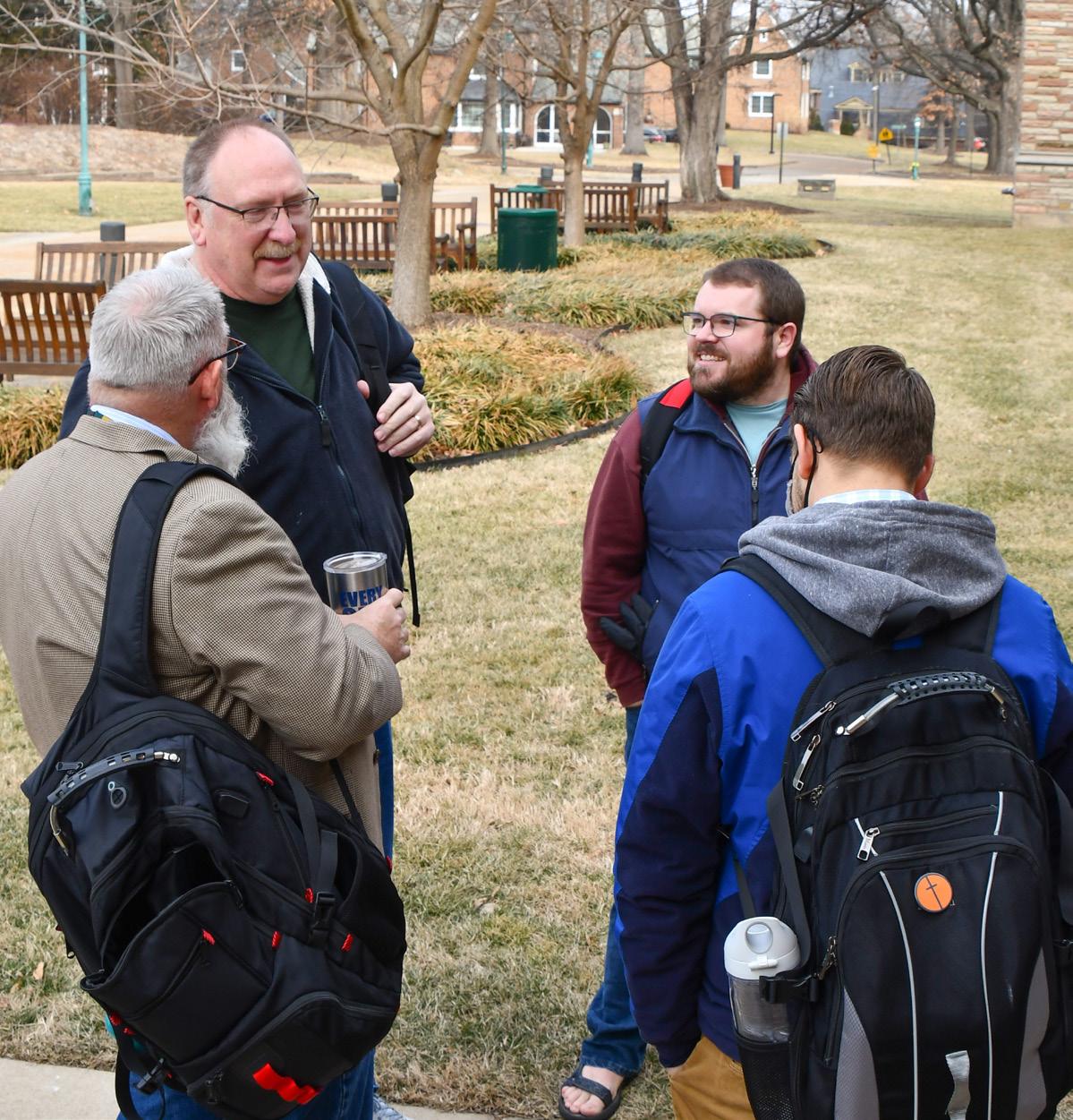
3 volumes: Cyril of Alexandria’s Commentary on John (2 volumes) and Cyril’s Commentaries on Romans, 1-2 Corinthians and Hebrews (1 volume)
3 4 5 6
For well over 1,500 years the early church fathers interpreted the Bible differently than we do today.
“Yet, we don’t talk much about it,” says Dr. David Maxwell, the Louis A. Fincke and Anna B. Shine Professor of Systematic Theology and the new chairman of Concordia Seminary’s Department of Systematic Theology.

Maxwell calls this an “exegetical elephant in the room,” one that prompted his foray into patristic exegesis, which is the study of how the early church fathers interpreted the Bible.
“Learning about the early church helps us — laypeople and clergy — figure out our place in the broader Christian tradition,” Maxwell says.
Maxwell initially became interested in the field of the early church primarily “because in Lutheranism, you have the Reformation, which talks about how we need to sharpen the church’s view of justification by faith. But that suggests that there’s some kind of discontinuity between us and the church before the Reformation,” Maxwell says. “On the other hand, if you look at the Book of Concord, you will see, in a number of places, that we’re in continuity with the early church. And so, I wondered, ‘Which is it?’”
This compelled Maxwell to deeper study, eventually obtaining a Ph.D. in this area from the University of Notre Dame in South Bend, Ind., in 2003.
Maxwell joined the Concordia Seminary faculty in 2004. As he was translating Cyril of Alexandria’s Commentary on John (InterVarsity Press), Maxwell wondered how the early church read the Bible? Not just what they say about justification, but their approach to the biblical text in general?
Ph.D., S.T.M., M.Div., M.A., B.A. German, Koine Greek and Latin Bonus fact: Maxwell also has a basic reading knowledge of French, Hebrew and Syriac. University of Notre Dame, Concordia Seminary, Washington University and University of Texas Piano and organ“Cyril is a church father who lived in the fourth and fifth century. And so, I researched in depth what he did with the biblical text. And it dawned on me that this is not exactly what we do with the biblical text. And so that’s an interesting difference.”
In the early church, the meaning of a certain Scripture text was found in its role in the larger story of salvation, while in contemporary exegesis, the meaning of the text is found in the original intent of the author as it was understood by the original readers in the historical context.
In addition to Cyril of Alexandria’s Commentary on John, Maxwell also translated Cyril of Alexandria’s Commentaries on Romans, 1 and 2 Corinthians, and Hebrews (InterVarsity Press). This translation work led to an interest in teaching students not only to read Koine Greek but also to listen to and speak the language. Maxwell leads an online group in listening and speaking Koine Greek. People from all over the country participate.
Learning to speak the language gives a “more intuitive sense of the language,” Maxwell says. “You learn it on a deeper level. If you experience it, not only trying to read it and parse the verb forms, but actually think in it and speak it and even dream in it, you just know it better.”
It was his study of Latin and Greek in college that played a role in discerning whether to go into the ministry. He also credits his grandfather with encouraging him to enter the ministry, a decision Maxwell made halfway through college.
After receiving his undergraduate degree from the University of Texas at Austin, he went on to study for not one, but two master’s degrees — a Master of Divinity (M.Div.) at Concordia Seminary and a Master of Arts (M.A.) from Washington University, St. Louis — graduating from both in 1995.
“It was a lot of work,” Maxwell says. “At Washington University, I read a lot of Greek and Latin for my classes, and it made me better at those languages.”
Maxwell obtained a Master of Sacred Theology from Concordia Seminary in 1997.
Maxwell notes that Greek often is viewed as instrumental in a seminarian’s studies since the New Testament originally
was written in Greek. But understanding Latin also is extremely important for understanding the history of the church, he said.
“Latin was used all the way through the Reformation. The 95 Theses were written in Latin. Half of Luther’s writings more or less were in Latin, not German, because that was the language for academic or scholarly work in the Middle Ages so that anyone could read them in other countries,” explains Maxwell, who teaches Latin in addition to courses in systematic theology, patristics and the history of exegesis.
Not only is Maxwell a theologian, he also is a musician. He became interested in playing the organ after growing up in the church and loving the hymns the organist played.
“I especially like Bach and the baroque period, and that’s kind of the heart and soul of organ music to begin with. So, it just seemed natural to love this music, and I decided I was going to learn how to play it,” Maxwell says.
Maxwell studied organ in college. “I was not a music major. This was just an elective. But the organ professor made me promise that I would practice 10 hours a week. That was the condition for me to take the organ and I did it. I was amazed at how much progress you can make if you actually practice for 10 hours a week,” he says.
Today he plays the organ regularly in church and at the Seminary. In conjunction with playing the organ, he has written on the theological symbolism in the organ music of J.S. Bach, particularly Bach’s “Clavierübung III,” which is based on Luther’s catechism hymns. More recently, he has produced organ videos on this topic, which are available at concordiatheology.org.
Maxwell certainly is a gifted theologian, linguist and musician. But most importantly, he does not keep his research or acquired knowledge and skill to himself. Whether he is teaching at the Seminary, leading his Koine Greek group, speaking at a symposium or Lay Bible Institute, translating commentaries or playing the organ for his church — Maxwell shares the good gifts that God has given him with others so that he might glorify God and help build others up in the faith.
“Learning about the early church helps us – laypeople and clergy–figure out our place in the broader Christian tradition.”
-DR. DAVID MAXWELL
“Christian Jones, missionary at large, Ann Arbor, Mich., deployed to the Franklin Avenue Mission in Flint, Mich., Michigan District.” The announcement of Rev. Christian Jones’ placement echoes throughout the Chapel of St. Timothy and St. Titus at Concordia Seminary on Call Day in 2019.
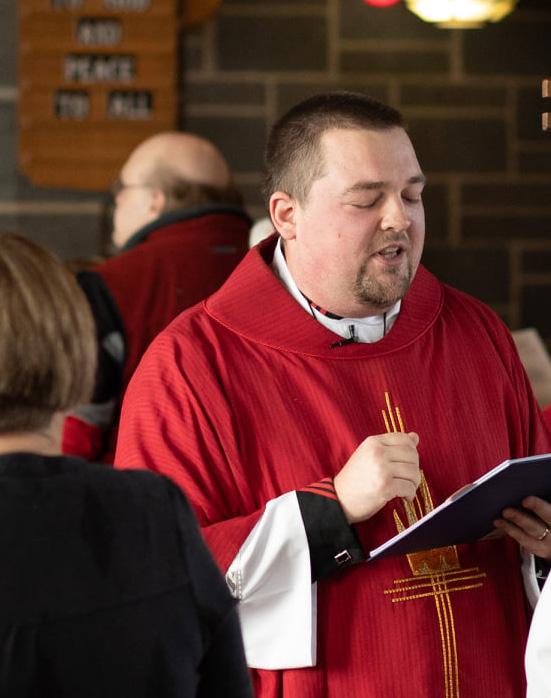
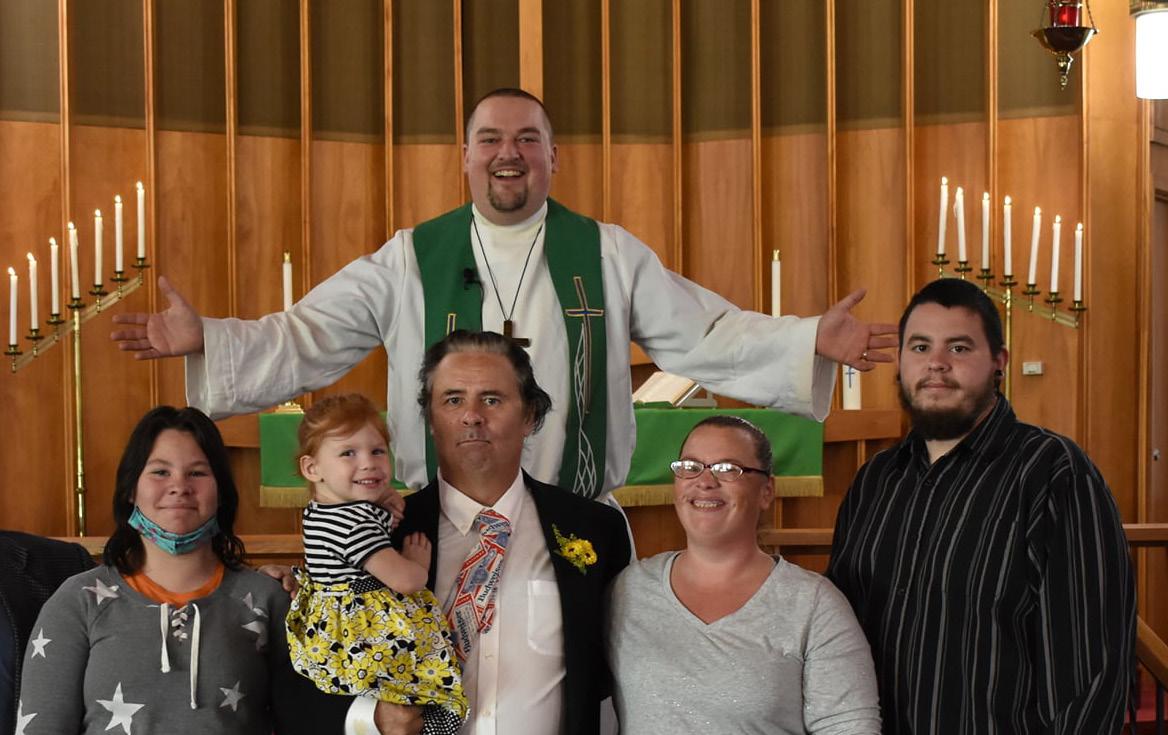
Now, almost four years after earning a Master of Divinity from the Seminary, Jones is executive director of the Flint Mission Network, which comprises the Franklin Avenue Mission, York Avenue Mission and two strategic partnerships: Wellspring Lutheran Services, which helps run the mission network’s Mercy House, a transitional housing ministry for homeless mothers and children, and The Luke Clinic, which provides free prenatal and antenatal care for mothers and infants.
Within the city of Flint, the Flint Mission Network is located in incredibly impoverished neighborhoods. “People are living in abandoned houses with no affordable source of groceries, a lack of schools and limited access to health care,” Jones says. “We’re trying to provide basic resources in our community as a way to love and serve our neighbor, especially in the midst of the gangs, shootings and drugs.”
These very real situations of ministry began right away for Jones, almost as soon as he and his family arrived in Flint.
“In my first six months of ministry, a 3-year-old was shot and killed up the street. He was the same age as my daughter at the time,” Jones remembers, tears welling in his eyes. “I was a young Seminary grad, visiting this family and thinking, ‘How can we walk together? How can we share our lives together in a way that produces hope?’”
So how does Jones do it? How does he minister in this hurting, broken community?
“Of course, there’s the typical Lutheran answer: our baptismal identity,” he says. “It’s nice to go around with our catechisms and say ‘You can be God’s child, too! You want to be baptized? Let’s go to the font!’ We can do those kinds of things, but the question is, so what? A 3-year-old child was shot. A mission member is hooked on crack. A girl is selling herself on the street. What sort of impact is our baptismal identity having there?”
Jones admits it is challenging. “We have to think about what it means to be Christians in our community,” he says. “What is our baptismal identity about? It is about our hope in Christ Jesus.”
Jones says his Seminary experience helped prepare him for his current ministry.
“Some of the best Seminary experiences I had were through my field education assignment. I was placed at Bethlehem Lutheran Church in north St. Louis with Dr. John Schmidtke before he passed away in May 2022. Schmidtke was the guy who put me in a van and said, ‘You’re going to drive up to that project over there, pick up the kids and bring them to church.’ And I thought to myself, ‘OK, this is terrifying. Don’t people get shot here?’ And they do. And we still went and shared the Gospel and our lives together.”
Jones reflects on the impact his mentor had on him.
“Schmidtke taught me by just sending me to go do it,” Jones recalls. “His entire focus was bringing the hope of Jesus to neighbors, kids and families regardless of their circumstance. So now, I go to an apartment with a mom, her boyfriend, seven kids, two bedrooms. You can literally see the dirt on the ground through the floor. And I sit there and I talk with them. When I go into these communities and kids see me, they scream ‘Pastor!’ I have that definitive identity as the one who goes and spends time with them and engages in their lives.”
Jones recounts a recent visit he made to one of his members who was in the hospital. In the same room with her was a 68-year-old woman who was sick and frail. “Though a member of a Baptist congregation, she had no pastor, no family, and she was dying,” he says. “My member and I were able to — not even metaphorically, but literally — pull the
curtain back and start sharing what we were going through in the hospital room.
“We were sharing the really big worries and questions of life together outside the walls of the church with someone who didn’t have anyone.
“When I went to visit again, the roommate said, ‘Pastor, I’m tired. I’m ready to go.’ I asked her, ‘Can I anoint you and remind you of the promises you have received in Christ Jesus?’ ‘Yes, Pastor, I’d like that.’ So I made the sign of the cross with my olive oil on her forehead and reminded her of her baptismal identity. I shared the Gospel with her in a very tangible way.”
The work of sharing the Gospel continues for Jones and the Flint Mission Network.

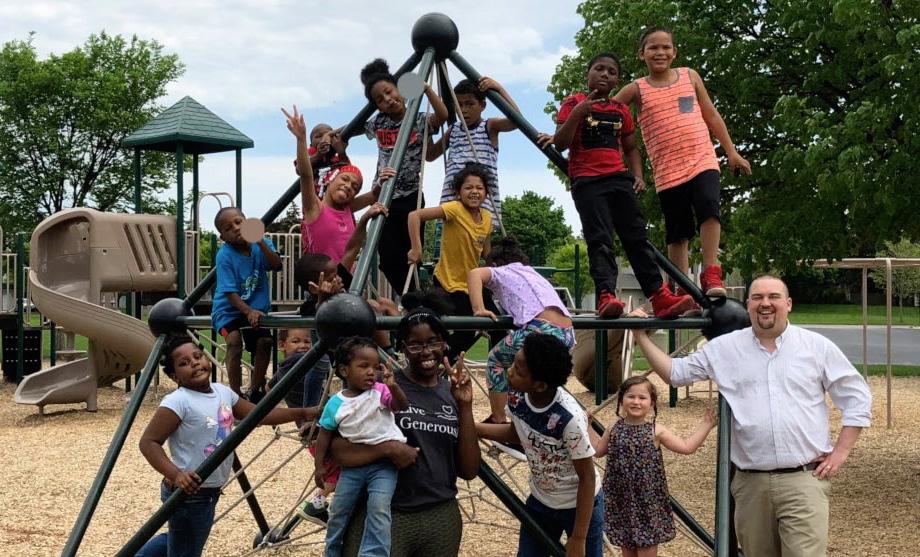
“I’m very thankful for those who have come along with us,” Jones says. “We have about 18 partner congregations that send volunteers. We minister to so many people, especially expecting and homeless mothers, through our strategic partnerships. Sharing our lives certainly includes inviting people over for barbeques and fun stuff like that. But, it’s more than that. It’s sharing where we’ve been and what we’re going through. It’s communicating the hope we have in Jesus. It’s who we are. We are people of hope.”
To learn more about Jones’ ministry and the Flint Mission Network, visit flintmissionnetwork.org/.
“HOW CAN WE WALK TOGETHER?
HOW CAN WE SHARE OUR LIVES TOGETHER IN A WAY THAT PRODUCES HOPE?”Jones and Flint Mission Network children hang out on the playground at St. Lorenz Lutheran Church in Frankenmuth, Mich., during a field trip. Photos: Courtesy Jones Jones leads the Reformation service and launch of the Flint Mission Network at York Avenue Mission Oct. 31, 2022.
-REV. CHRISTIAN JONES
A young mother holds her baby girl close as her husband navigates a bumpy road. Another daughter rides in the backseat. The year is 1918, and the young family is traveling from Missouri to Montana by way of California.
“My mother must have been out of her mind to take off on a road trip across the country with a 6-month-old baby,” said Virginia Hoffman Slusser, who was the baby in the story. She turned 105 this past September.
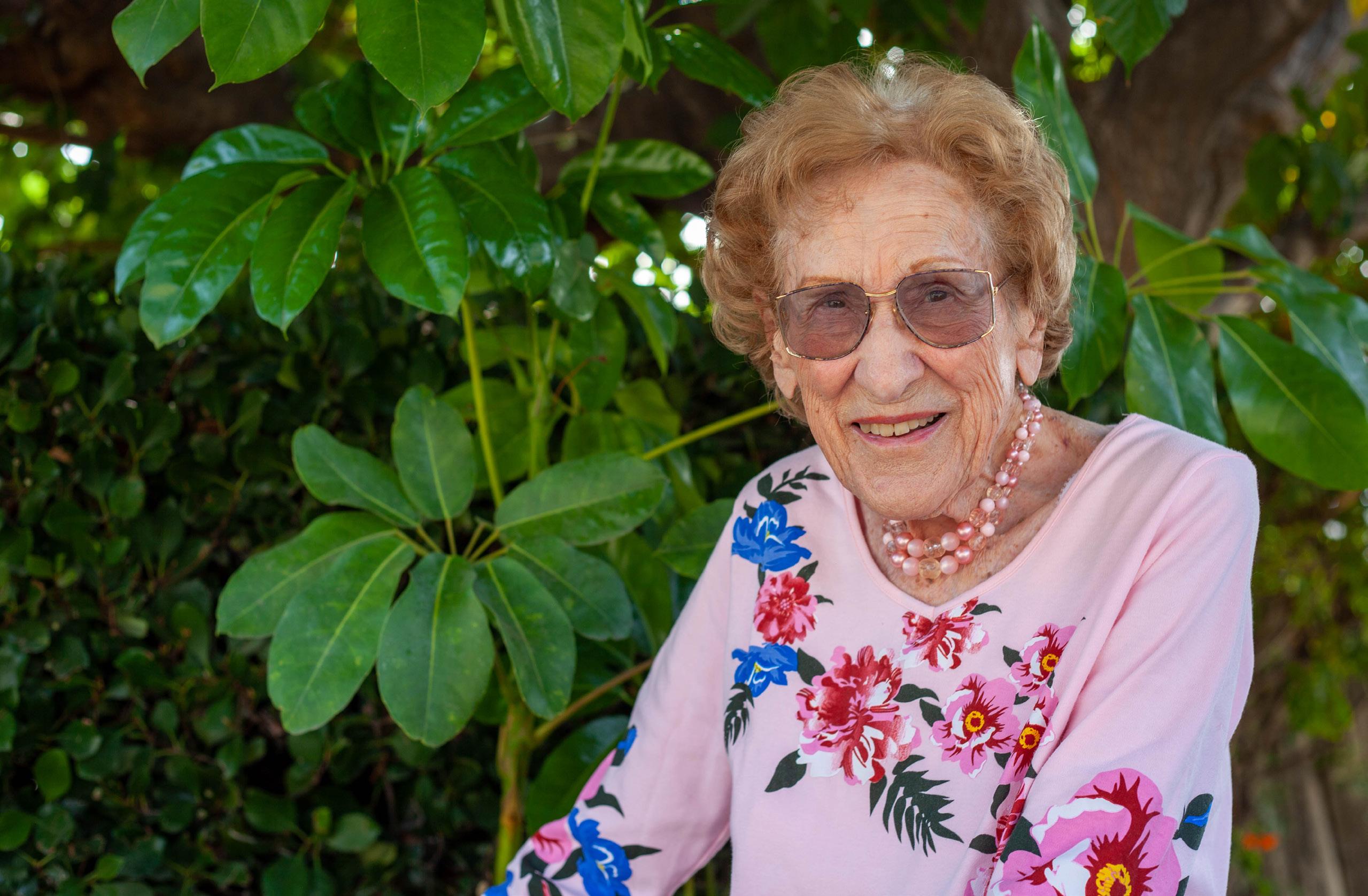
The trip was long and hard. The speed limit in 1918 was 35 mph. The family stopped for two weeks due to rain. Each night, Virginia and her sister slept in the car and their parents, Benjamin and Emma, slept in a tent just outside the car. By the time they reached California, the trip had taken two and a half months. Emma was weary from travel and declined to make the final leg of the journey to Montana.
Benjamin, a trained jeweler from St. Louis, was able to get a job immediately in Los Angeles. But homesteading was still coursing through his veins. He purchased five acres of raw land in the San Fernando Valley, known as Roscoe at that time, to start a chicken ranch. The young family worked to clear the land of cacti and snakes. Benjamin
built the garage first and the family lived there until the house was constructed. He bought chickens and the family sold eggs.
But the most important part of their lives was missing.
“When we moved to Roscoe, there weren’t any nearby Lutheran churches,” Virginia said. “So, my father, along with the Lutheran Laymen’s League, helped found the First Lutheran Church of Burbank. We made lifelong friends in that church.”
Virginia fondly remembers her father and how much he loved serving the church. While he wasn’t trained as a pastor, he stepped in to help wherever he could. “He was the best Christian that I have ever met in my life,” Virginia said.
Perhaps Benjamin’s love for sharing the Gospel could be attributed at least in part to his parents — Virginia’s grandparents — who lived and worked on the campus of Concordia Seminary in the 1800s. Her grandfather served as a custodian at the Seminary and her grandmother was the cook. Virginia’s father was born on the campus in 1886.
When Virginia was 10, her parents traded their California land for an apartment building inside the city of Los Angeles. Virginia attended Hollywood High School with about 500 other students, some of whom went on to stardom in the movie industry. She graduated in 1934 and went to college for a few years until the family needed her to work. In 1938, she took a job as a secretary at Lockheed Martin, an aircraft manufacturing company. It was there that she would eventually meet her future husband, Gerald. They married in 1941.
At the time, Lockheed workers were building airplanes destined for England as the country was deep into World War II. Virginia recalls that screens covered the work yards to camouflage their work.
Virginia remembers that Gerald met Howard Hughes and Amelia Earhart because they brought their airplanes into the plant to get them repaired. Virginia worked as a secretary at Lockheed for five and a half years until she became pregnant with their son, Ronald, who became a physicist and worked at NASA’s Jet Propulsion Laboratory for 30 years.

In 2007, Ronald died in a car accident. Six months later, Gerald also died.
In May 2021, Virginia contacted the Seminary to share the meaningful connections that she had with the Seminary throughout her life: her grandparents who had worked at the Seminary so long ago; her father who lovingly taught her about the faith and helped start the First Lutheran Church of Burbank; and the practical care and ministry that Rev. Mike Harnack (’09) and his wife, Dawn, provide to her and others in the congregation today.
Each of these connections encouraged Virginia to look to the future by remembering the Seminary in her estate plan. With the help of the Seminary’s Director of Principal Gifts Mike Flynn, she established a charitable remainder trust. By doing so, she has become a member of the Seminary’s Legacy Society, which honors those donors who have chosen to remember the Seminary in their will or estate plan.
Virginia’s life so far has been an adventurous one and her planned giving will help further Concordia Seminary’s ongoing mission of forming future pastors, deaconesses and missionaries to shepherd congregations and share the Gospel worldwide for generations to come.

The 184th academic year for Concordia Seminary began Friday, Aug. 26, 2022, with the Opening Service in the Chapel of St. Timothy and St. Titus. During the Opening Service, Seminary President Dr. Thomas J. Egger preached on the 2022-23 academic theme “Sharing the Gospel— Sharing our Lives” based on 1 Thess. 2:8. During the service, the Seminary’s new Provost and Professor of Exegetical Theology Dr. Ronald Mudge was installed. In addition, three current professors were installed into new positions, and one visiting professor and three staff members were installed. Also, 44 distance students who received their vicarage and internship assignments were recognized. The Seminary welcomed 121 new students for the fall term across its Ministerial Formation and Advanced Studies programs.
In 2022 Concordia Seminary marked the 20th year of its residential Deaconess Studies Program. As part of the anniversary celebration, alumnae gathered July 18 for a special luncheon in Koburg Hall commemorating the program that has been preparing women for service to the church as deaconesses for two decades. Alumnae in attendance at the event included graduates from the beginning of the residential program to recent graduates. Several current residential deaconess students also joined the celebration.
Director of Deaconess Studies Deaconess Dr. Gillian Bond, left, and Deaconess Elizabeth Ahlman (’07) at a special luncheon held July 18, 2022, in Koburg Hall to celebrate the 20th anniversary of the Seminary’s residential Deaconess Studies Program.
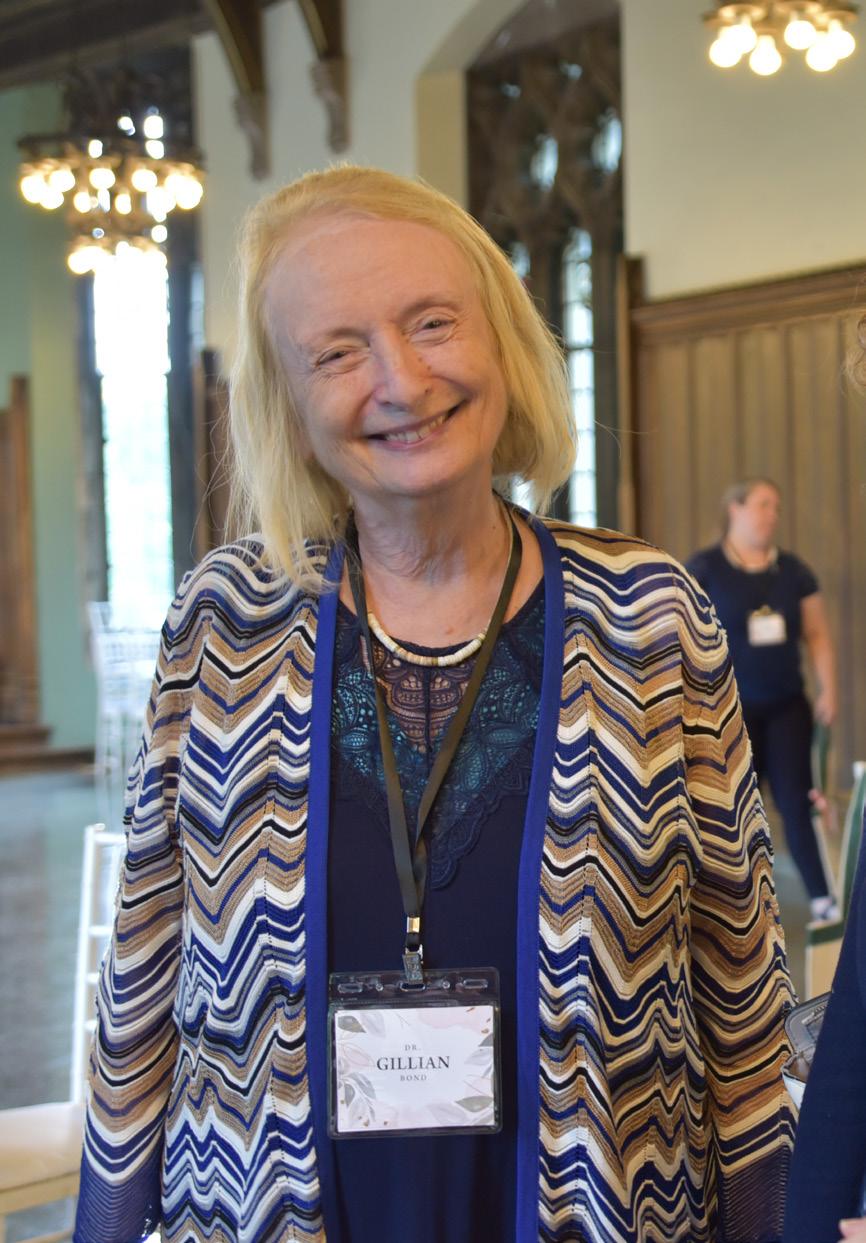
After a year of gathering input and planning, the Board of Regents approved a new five-year strategic plan Nov. 3, 2022, that reflects upon, articulates and rededicates Concordia Seminary’s identity, mission and vision for continued growth and success in serving its students, donors, alumni and the congregations of The Lutheran Church—Missouri Synod and partners around the globe. Scan the code or visit csl.edu/about to view the Seminary’s 2022-26 Strategic Plan and watch summary videos about the plan.
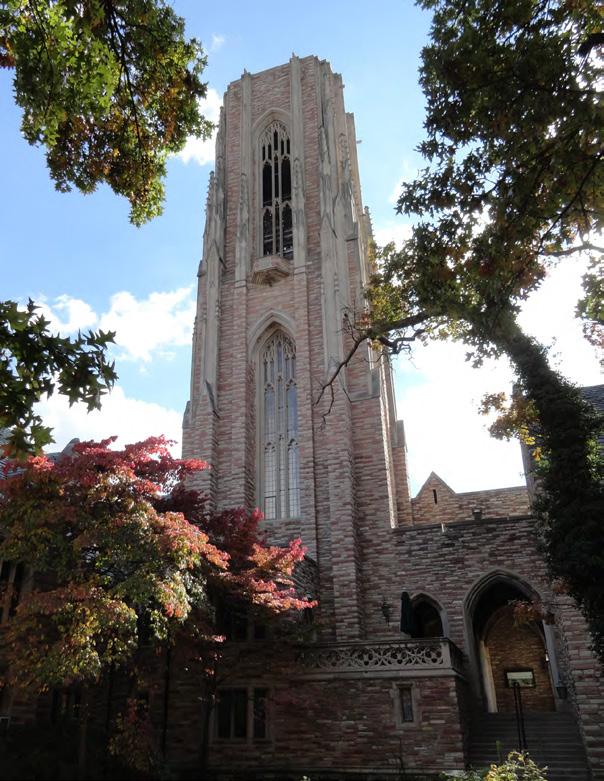

Cover of the 2022-26 Strategic Plan
Dr. Jacob “Jack” Aall Ottesen Preus III, former professor of Systematic Theology and dean of faculty at Concordia Seminary, died Aug. 4, 2022, in Apache Junction, Ariz. He was 69 years old. Preus faithfully served the church as pastor, professor, university president and administrator. He lectured and taught extensively throughout Latin America, Africa, Asia, Southeast Asia and across the United States. In 1986, Preus joined the faculty at Concordia Seminary. He served as assistant professor of Systematic Theology (1986-93), chairman of the Department of Systematic Theology (1992-94), associate professor of Systematic Theology (1997-98) and dean of faculty (1994-98). Also, he was the liaison to the Instituto Hispano de Teologia, the precursor to the Seminary’s Center for Hispanic Studies. Preus is survived by his wife, Sherry; their three children, J.A.O. IV, Emily Kathryn and Rebecca Elizabeth; and eight grandchildren. Memorial donations may be made to Concordia Seminary, St. Louis; Concordia University, Irvine, Calif.; and Christ Greenfield Lutheran Church, Gilbert, Ariz.
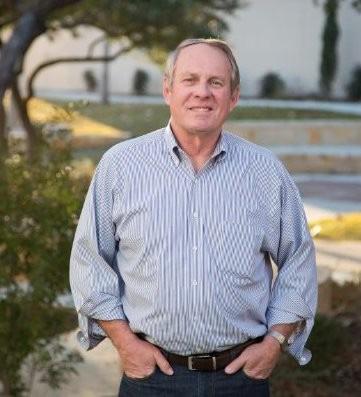
The new stained glass windows in the Chapel of St. Timothy and St. Titus were dedicated Nov. 2, 2022, during a special service. Professor of Practical Theology Dr. David Schmitt, a member of the stained glass committee that oversaw the design and installation of the windows by Lynchburg Stained Glass between 2020 and 2022, preached and the Seminary’s premier choir, Laudamus, sang. A gift from the Eugene E. and Nell S. Fincke Memorial Trust funded the installation of windows throughout the entirety of the chapel — chancel, transepts, nave and narthex. The Te Deum Laudamus (We Praise You, O God), a historic text of praise to God, serves as a thematic touchpoint for the windows, which depict the crucifixion, resurrection and exaltation of Jesus Christ.
Light shines through the “Prophets and Nativity” windows during the dedication of the chapel stained glass windows Nov. 2, 2022.
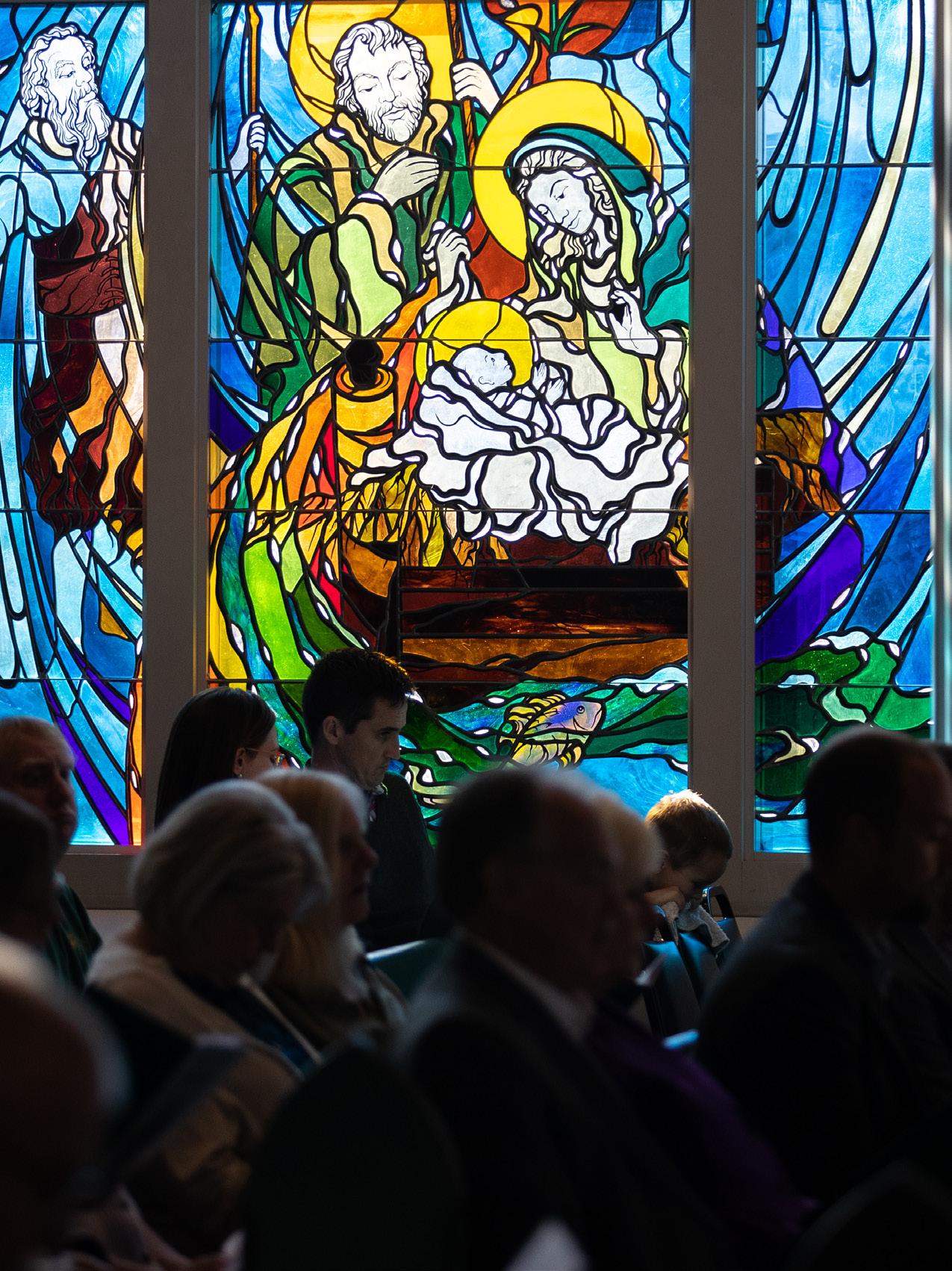
Photo: Michael Thomas
Some 550 Seminary supporters joined together Sept. 26, 2022, to support Concordia Seminary’s fourth annual #GiveGreenandGold Day and raised a record $84,750 — more than double the campaign goal of $40,000. Additionally, on Nov. 29, 2022, the annual Giving Tuesday campaign raised a record $125,546 from 370 donors, exceeding the $100,000 goal by 25% and all previous tallies for the Seminary’s Giving Tuesday campaigns. Gifts from both campaigns, two of the Seminary’s three annual giving days, will be used where needed most in the Seminary’s ongoing mission to prepare the church’s future pastors, deaconesses, missionaries and other church leaders. To learn more about the Seminary’s annual giving days, visit csl.edu/giving-days.
Students and their families, faculty and staff were encouraged to pick up buttons picturing Seminary landmarks during #GiveGreenandGold Day Sept. 26, 2022. Photo: Sarah Maney
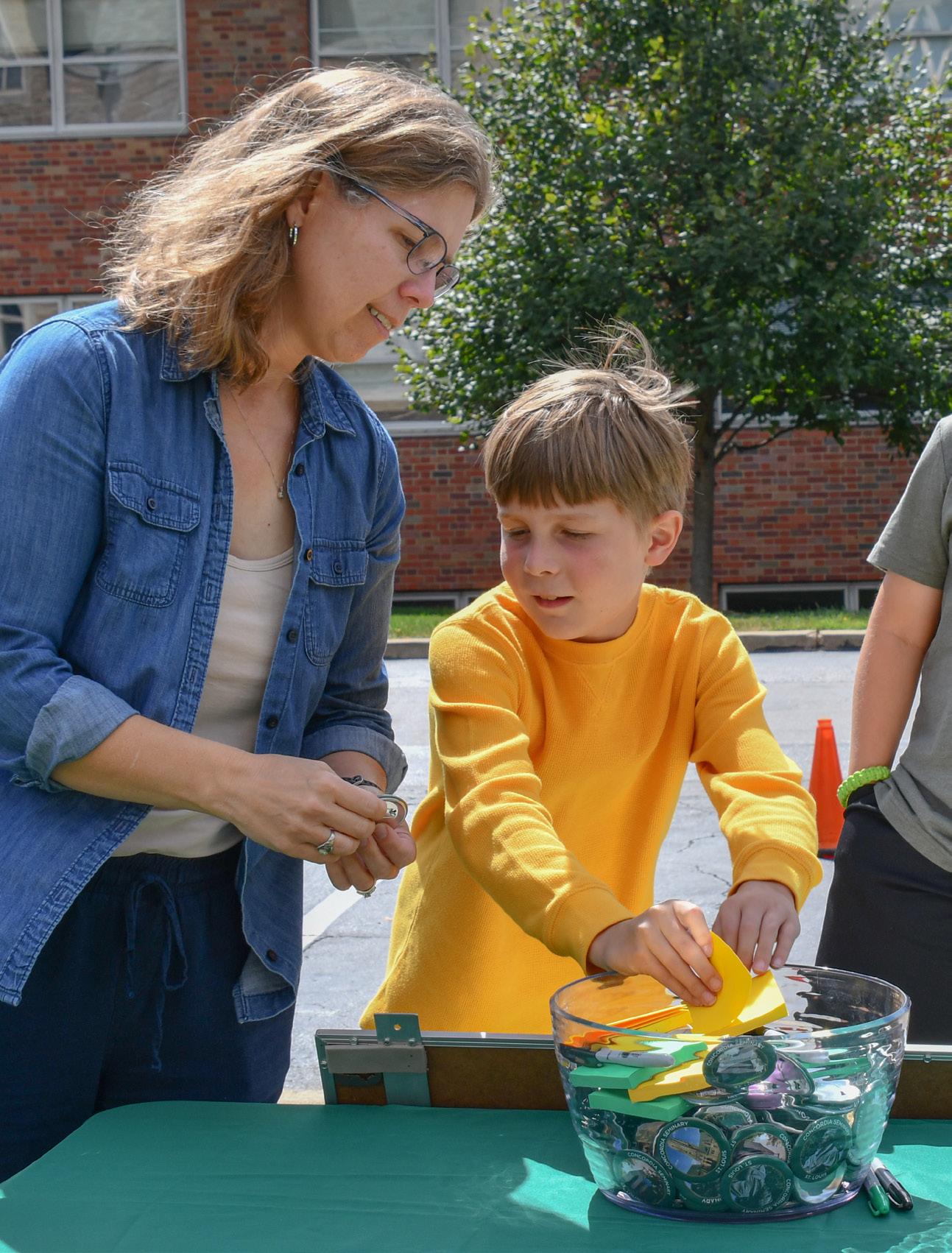
Dr. John Loum, former director of the Ethnic Immigrant Institute of Theology (EIIT) at Concordia Seminary and missionary to The Gambia, died Oct. 26, 2022. He was 74 years old. “Dr. Loum’s commitment to sharing the Gospel of Jesus among African immigrants in America, and among immigrant communities from all around the world, has yielded remarkable fruit,” said Dr. Thomas J. Egger, Seminary president. Loum served as director of the EIIT from 2006 to 2020. From 2017 until 2020, he also served as a part-time missionary to The Gambia, his home country, on behalf of The Lutheran Church—Missouri Synod (LCMS) and the Seminary. He was the first LCMS missionary called to The Gambia, a predominantly Muslim country. Loum is survived by his wife, Hannah; four sons, John Jr., Hans, Cyril (Sunita) and Donald; and grandchildren, Giovanna, Josiah and Noah.
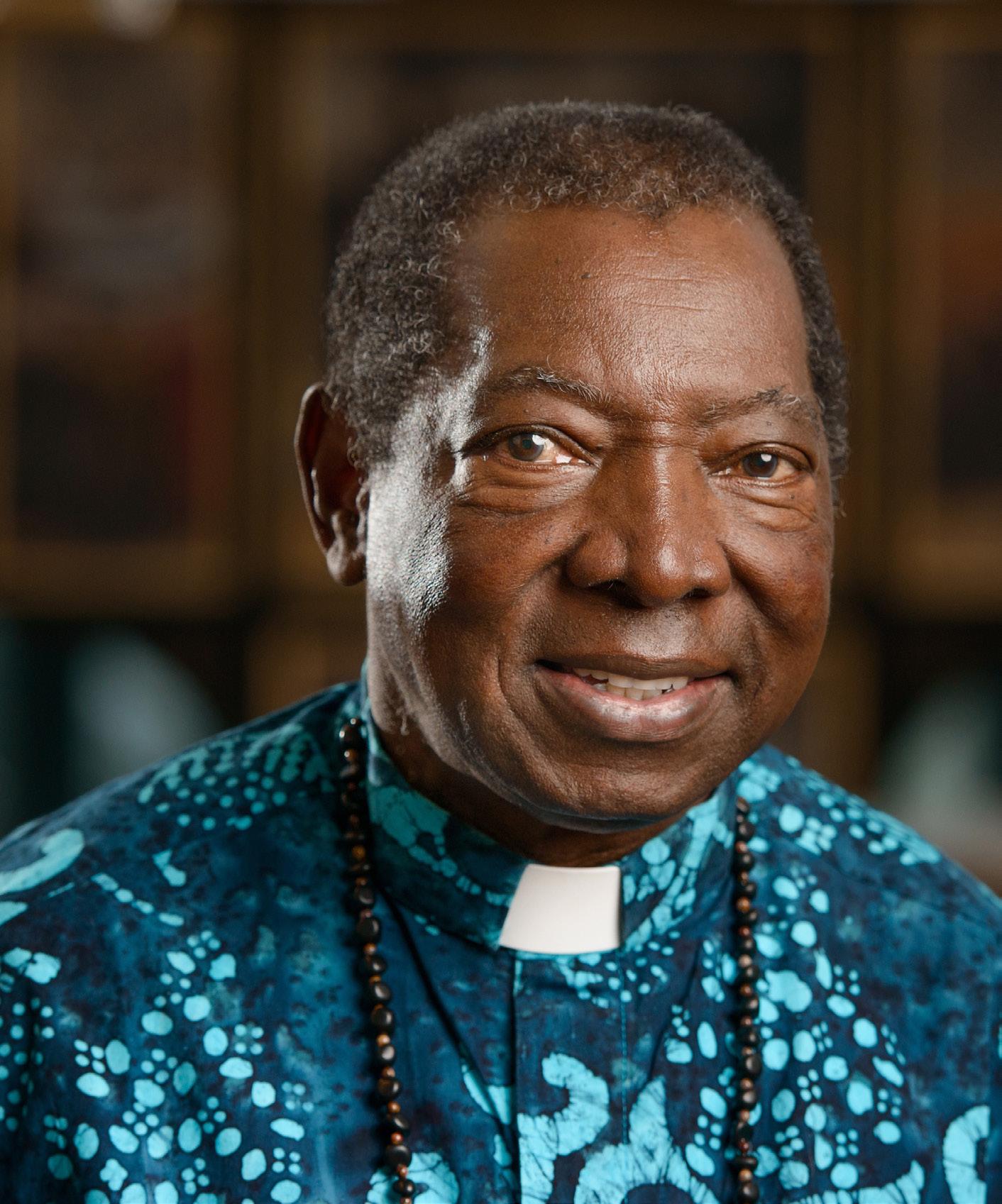
The annual Alumni Reunion for graduates of Concordia Seminary was held Oct. 13-14, 2022, on campus. This year’s reunion extended a special welcome to members of the jubilarian class of 1972 and graduates, spouses and widows of class years ending in “2” or “7.” The reunion included a presentation by Seminary President Dr. Thomas J. Egger, class gatherings and a closing banquet featuring a performance by Laudamus, the Seminary’s select choir of seminarians.


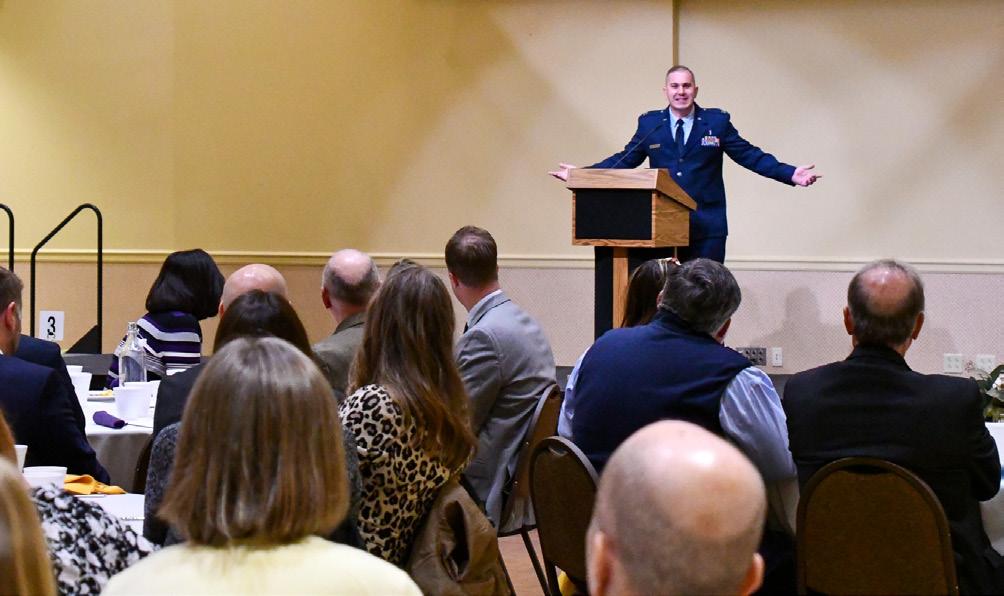
About 300 people attended the annual Lutheran Prayer Breakfast Nov. 2, 2022, at the LiUNA Event Center in St. Louis. The annual event, sponsored by several St. Louis-based Lutheran ministries, is an opportunity for attendees to reaffirm faith, celebrate fellowship and join together in prayer and proclamation of God’s grace through Christ. Speaking at this year’s breakfast was Rev. Travis Ferguson (M.Div. ’17), associate pastor of Christ Lutheran Church Ministries in La Mesa, Calif. He spoke on “Quo Vadis? The Uncomfortable Call of Christ In an Age of Comfortability.” Ferguson has served as a chaplain in the U.S. Air Force since 2014. Rev. Travis Ferguson serves as the speaker during the breakfast Nov. 2, 2022.
Representing four of Concordia Seminary’s programs, five students were recognized Nov. 4, 2022, in the Chapel of St. Timothy and Titus for receiving pastoral and diaconal calls and completing their programs, and one student was recognized for receiving her deaconess internship assignment. “I am confident that these men and women will seek to serve our Lord’s church faithfully and with well-developed skills,” said Dr. Glenn Nielsen, director of Placement, Vicarage and Deaconess Internships, and Certification. “Each name spoken represents a person who has been sent to bring Jesus to people in congregations and institutions who need His gracious and loving presence.”
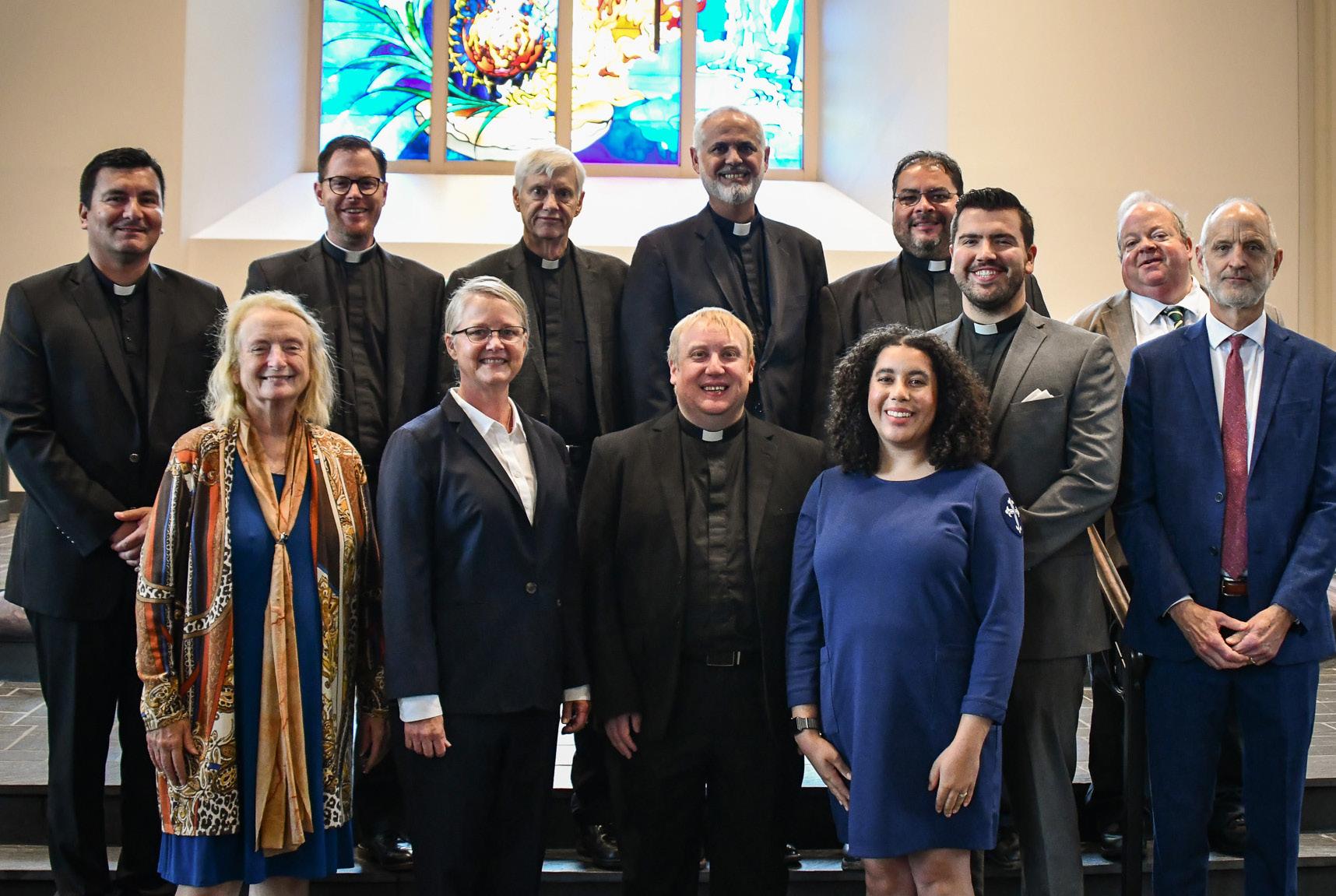
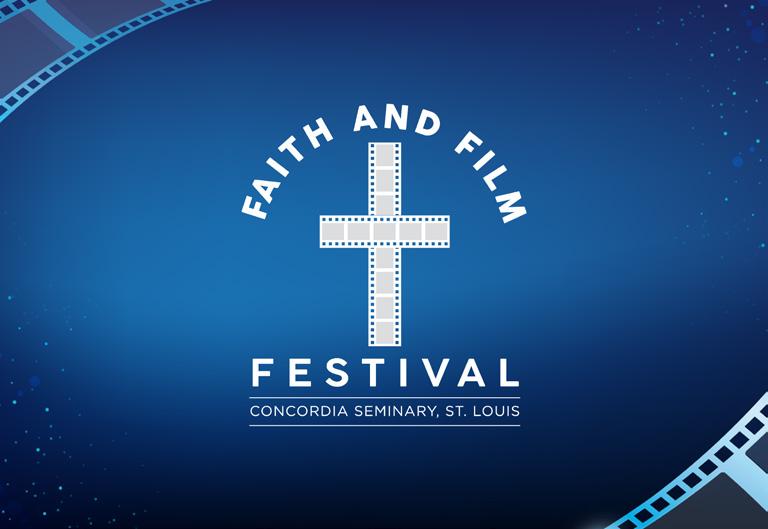
map-marker-alt Concordia Seminary, St. Louis laptop csl.edu/faith-and-film
JAN 26-28

JAN 17 -FEB 21
Co-sponsored with Concordia University Wisconsin and Ann Arbor map-marker-alt Online workshop laptop csl.edu/event/making-sense-of-ministry-in-a-digitalworld/2023-01-24/
Lutherans Listening to C.S. Lewis
user Dr. Erik Herrmann map-marker-alt Concordia Seminary, St. Louis laptop csl.edu/lbi
Register by: Jan. 23, 2023 • Fee: $20

.org
NEW: Articles on Absolution and Christology illustrated, a Preachers Studio video with Dr. David Schmitt, a video about Luther’s letters to people suffering with depression, an interview with new Provost Dr. Ronald Mudge and the recording of the “500th Anniversary Lecture: Martin Luther’s New Testament Translation.”
